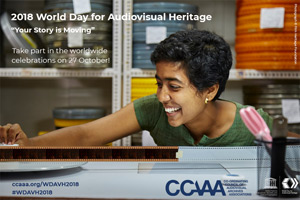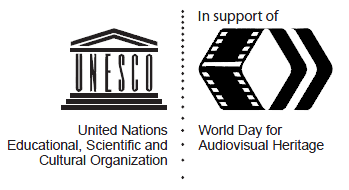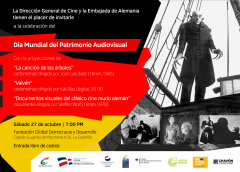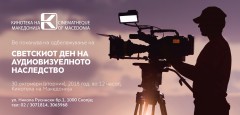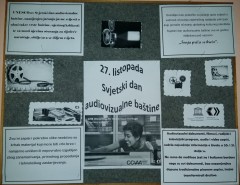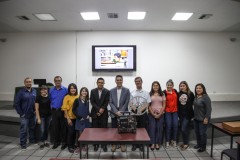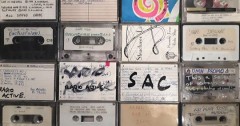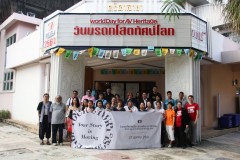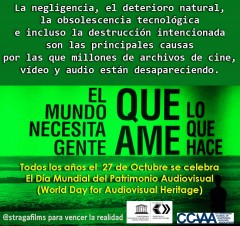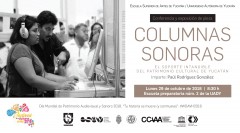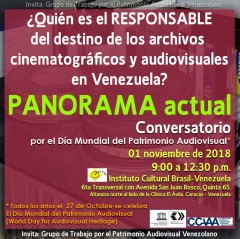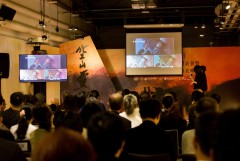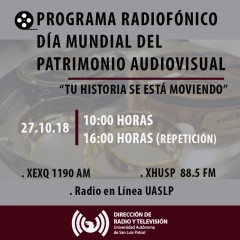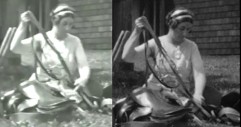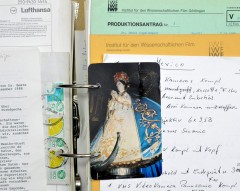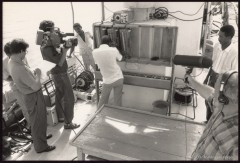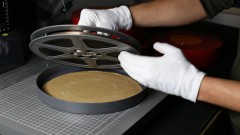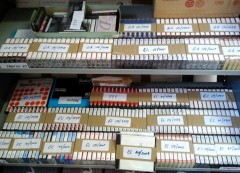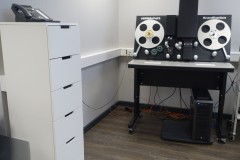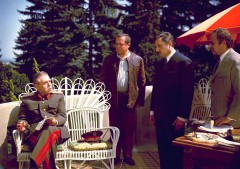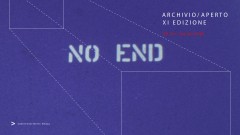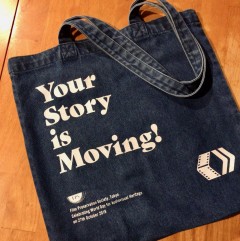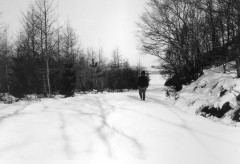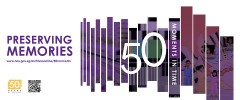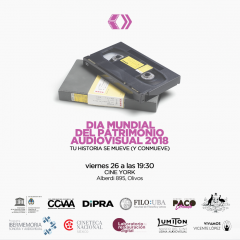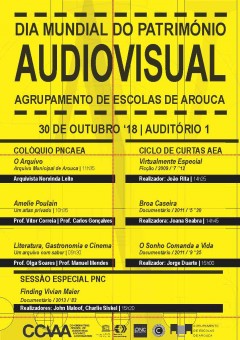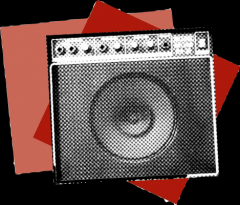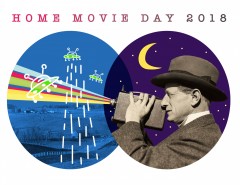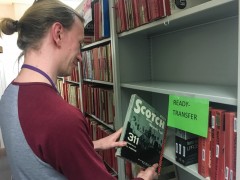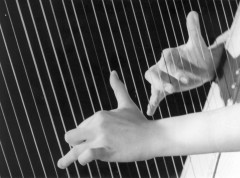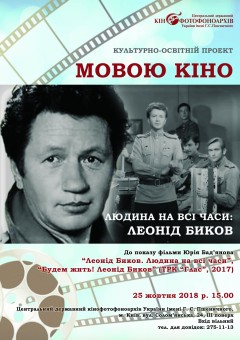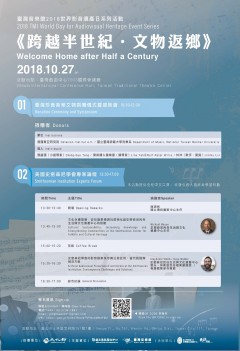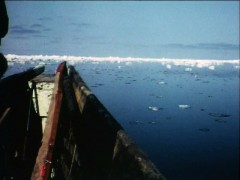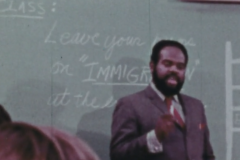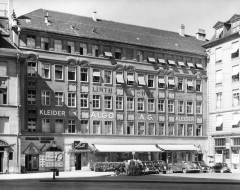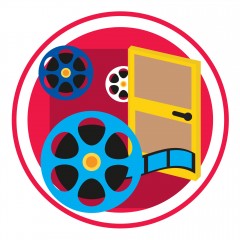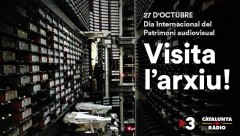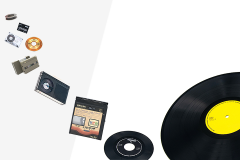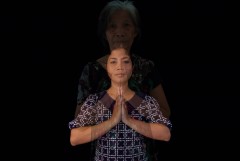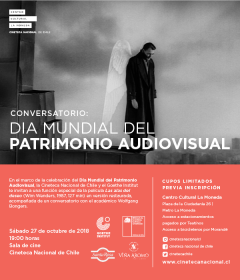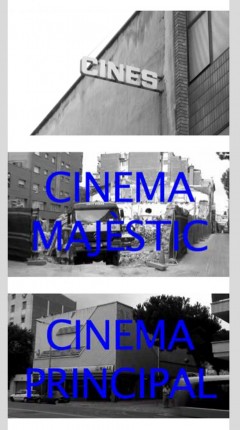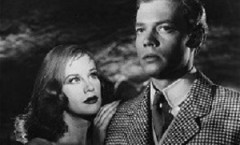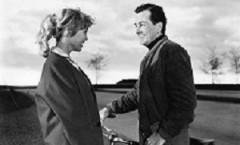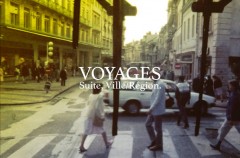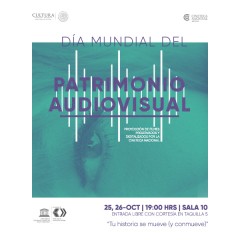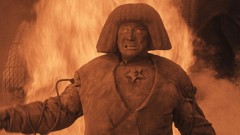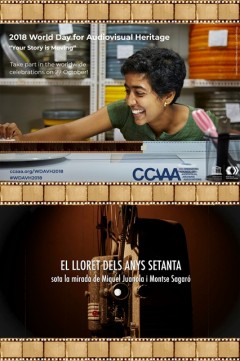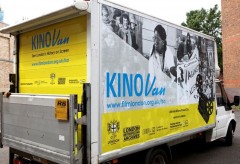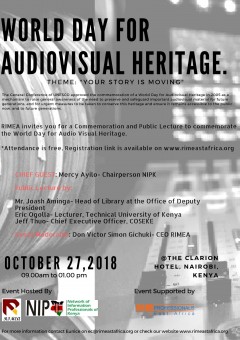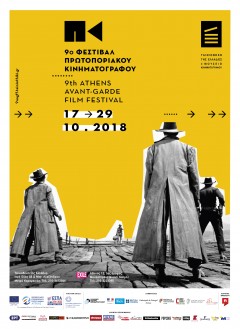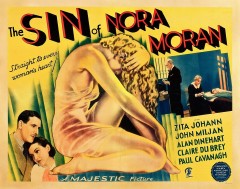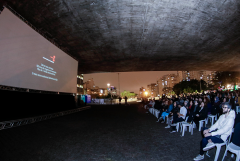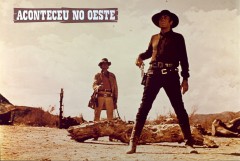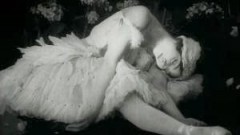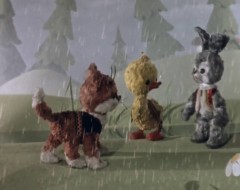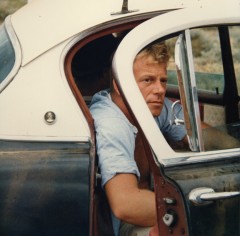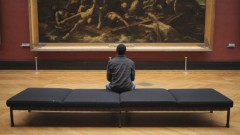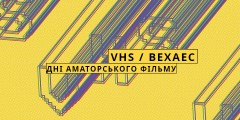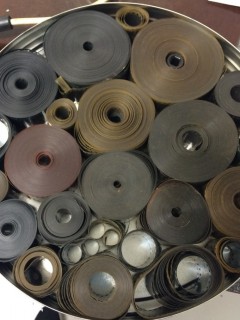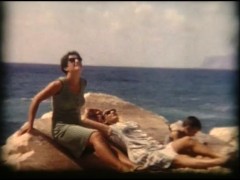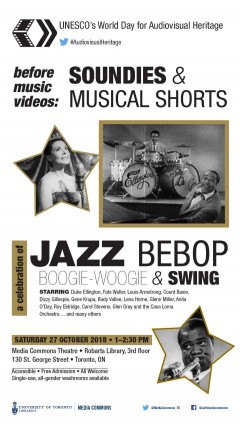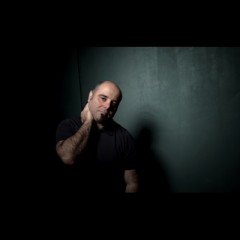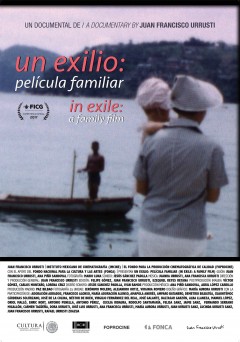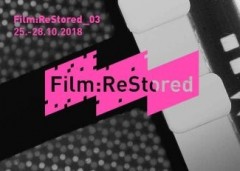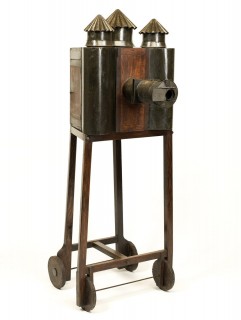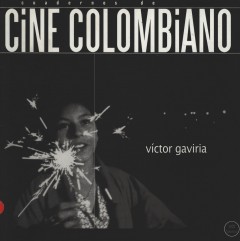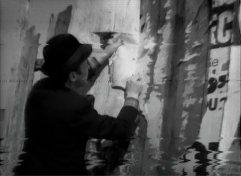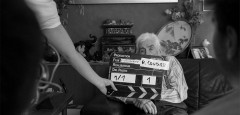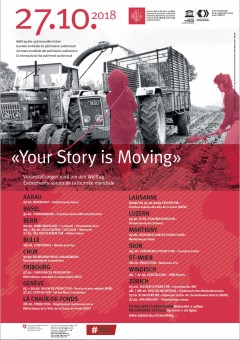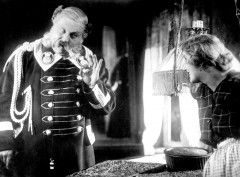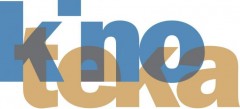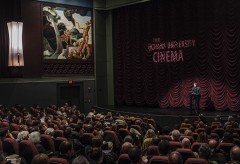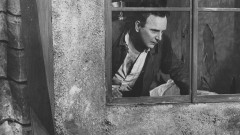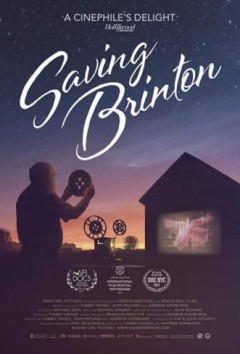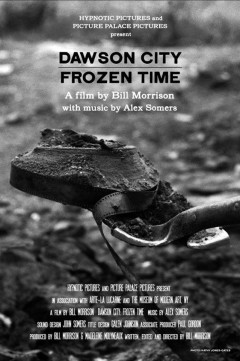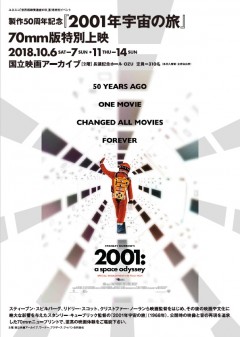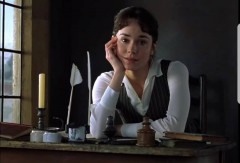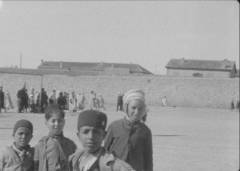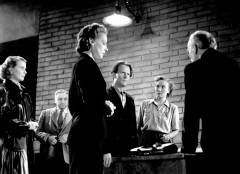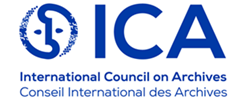The World Day for Audiovisual Heritage has become a key initiative for both UNESCO and the Coordinating Council of Audiovisual Archives Associations (CCAAA) to honour audiovisual preservation professionals and institutions that help to safeguard this heritage for future generations despite the many technical, political, social, financial, and other factors that threaten its survival. Audiovisual archives around the world join together annually on 27 October to celebrate their work with activities and events that not only highlight the vulnerability of this heritage, but also celebrate the often unheralded work of the heritage institutions that protect it.
This year the theme of the World Day for Audiovisual Heritage is "Your Story is Moving". Here is the CCAAA Board's official statement about this year's theme:
Every year millions of people record stories of all varieties on audiovisual media, ranging from narratives of everyday life to historic events. These moments are chronicled and stored each day on multiple formats and media, whether they are digital or analogue. How do we ensure that this ever-growing corpus that is our cultural history today is preserved and exists in the future? And how do we guarantee that this rapidly accumulating, collective moving story of ours is not lost, as much of our history on these fragile media has been over the past 150 years?
Reliably, thousands of archivists, librarians and preservationists around the world strive to make our world’s cultural heritage accessible and safeguard it for the future. In addition to their daily efforts to provide access to historic collections housed in established archives, archivists actively rescue collections in danger of loss or destruction due to poor climates, less than ideal storage conditions, political unrest or the economic challenges that many countries are confronted with daily.
Our stories are moving in many ways. First, they move through the very act of playing this unique material on the original equipment that transports the object as part of viewing or hearing it, whether it is motion picture film, a vinyl record, an audio cassette or a videotape.
Second, as physical objects, made of organic material, these items are constantly and naturally moving through an ongoing state of decay, are deteriorating, and moving towards inaccessibility as they travel through their own timeline. This constant deterioration serves as an even stronger argument for supporting the ongoing efforts of the world’s archivists to preserve our audio-visual heritage.
Third, in countries and institutions with resources available to digitize collections, the rate at which our stories can now quickly move around the globe, thanks to the newest digital communication technologies now allows us to share our stories faster and ever more widely to more locations around the world than ever before.
Lastly, of course, stories move us emotionally. We see this every year on Home Movie Day, an event that provides a moment for publics around the world to bring their visual cultural heritage to archives and libraries, to view, sometimes for the first time in decades. As they see lost family members, loved ones and ancestors long gone come to life on the screen, tears flow, emotions are high, and these moments of our captured history transport us to new heights as our histories unfold before our eyes. History too comes to life through the power of the moving image and in sound recordings which connect us personally with those events and moments in time which have shaped our memories and who we are.
On October 27, please join us in celebrating our audio-visual heritage, and help us acknowledge the work done every day to preserve our stories so that they will endure for future generations.
The statement is also downloadable as a PDF file in ENGLISH, FRENCH, and SPANISH. The poster for this year's World Day can be downloaded HERE.
The eight associations forming the CCAAA (AMIA, ARSC, FIAF, FIAT-IFTA, FOCAL International, IASA, ICA, SEAPAVAA) strongly encourage all their members (and any other institutions) not only to join in the global celebrations of the 2018 World Day on and around 28 October, but also to share the information about their particular events, by filling the quick-and-easy form below (click on « Add a new World Day for Audiovisual Heritage event» below). Your descriptive text can be in the language of your choice (or even better... in several languages), but we ask you to limit it to 500 words max. You can also attach one image per event. Please fill in and submit one form per event. Your contributions will be automatically added to the list of Word day events on this page (the latest added event will appear at the top of the list).
Happy 2018 World Day for Audiovisual Heritage !
The World Day for Audiovisual Heritage has become a key initiative for both UNESCO and the Coordinating Council of Audiovisual Archives Associations (CCAAA) to honour audiovisual preservation professionals and institutions that help to safeguard this heritage for future generations despite the many technical, political, social, financial, and other factors that threaten its survival. Audiovisual archives around the world join together annually on 27 October to celebrate their work with activities and events that not only highlight the vulnerability of this heritage, but also celebrate the often unheralded work of the heritage institutions that protect it.
This year the theme of the World Day for Audiovisual Heritage is "Your Story is Moving". Here is the CCAAA Board's official statement about this year's theme:
Every year millions of people record stories of all varieties on audiovisual media, ranging from narratives of everyday life to historic events. These moments are chronicled and stored each day on multiple formats and media, whether they are digital or analogue. How do we ensure that this ever-growing corpus that is our cultural history today is preserved and exists in the future? And how do we guarantee that this rapidly accumulating, collective moving story of ours is not lost, as much of our history on these fragile media has been over the past 150 years?
Reliably, thousands of archivists, librarians and preservationists around the world strive to make our world’s cultural heritage accessible and safeguard it for the future. In addition to their daily efforts to provide access to historic collections housed in established archives, archivists actively rescue collections in danger of loss or destruction due to poor climates, less than ideal storage conditions, political unrest or the economic challenges that many countries are confronted with daily.
Our stories are moving in many ways. First, they move through the very act of playing this unique material on the original equipment that transports the object as part of viewing or hearing it, whether it is motion picture film, a vinyl record, an audio cassette or a videotape.
Second, as physical objects, made of organic material, these items are constantly and naturally moving through an ongoing state of decay, are deteriorating, and moving towards inaccessibility as they travel through their own timeline. This constant deterioration serves as an even stronger argument for supporting the ongoing efforts of the world’s archivists to preserve our audio-visual heritage.
Third, in countries and institutions with resources available to digitize collections, the rate at which our stories can now quickly move around the globe, thanks to the newest digital communication technologies now allows us to share our stories faster and ever more widely to more locations around the world than ever before.
Lastly, of course, stories move us emotionally. We see this every year on Home Movie Day, an event that provides a moment for publics around the world to bring their visual cultural heritage to archives and libraries, to view, sometimes for the first time in decades. As they see lost family members, loved ones and ancestors long gone come to life on the screen, tears flow, emotions are high, and these moments of our captured history transport us to new heights as our histories unfold before our eyes. History too comes to life through the power of the moving image and in sound recordings which connect us personally with those events and moments in time which have shaped our memories and who we are.
On October 27, please join us in celebrating our audio-visual heritage, and help us acknowledge the work done every day to preserve our stories so that they will endure for future generations.
The statement is also downloadable as a PDF file in ENGLISH, FRENCH, and SPANISH. The poster for this year's World Day can be downloaded HERE.
The eight associations forming the CCAAA (AMIA, ARSC, FIAF, FIAT-IFTA, FOCAL International, IASA, ICA, SEAPAVAA) strongly encourage all their members (and any other institutions) not only to join in the global celebrations of the 2018 World Day on and around 28 October, but also to share the information about their particular events, by filling the quick-and-easy form below (click on « Add a new World Day for Audiovisual Heritage event» below). Your descriptive text can be in the language of your choice (or even better... in several languages), but we ask you to limit it to 500 words max. You can also attach one image per event. Please fill in and submit one form per event. Your contributions will be automatically added to the list of Word day events on this page (the latest added event will appear at the top of the list).
Happy 2018 World Day for Audiovisual Heritage !
Click HERE to open a new window with a printable version of the list below.
La Embajada de Alemania en Santo Domingo y la Dirección General de Cine (DGCINE), a través de la Cinemateca Dominicana, con el apoyo del Festival de Cine Global Dominicano (FCGD), la Escuela de Cine de Altos de Chavón, la Delegación de la Unión Europea y el Goethe Institute, conmemoran el Día Mundial del Patrimonio Audiovisual, a celebrarse el sábado 27 de octubre en las instalaciones de la Fundación Global Democracia y Desarrollo (FUNGLODE).
En el marco de esta celebración se proyectará el cortometraje La Canción de los Árboles (16mm, 1965), dirigido por el investigador José Luis Sáez. Esta obra cinematográfica experimental fue realizada en homenaje al poeta norteamericano Robert Frost y participó en el 8.º Certamen de Cine Iberoamericano de Bilbao, en 1966. El mismo tiene una duración de 15 minutos y es patrimonio preservado en el archivo fílmico de la Cinemateca Dominicana.
Como cortesía de la Escuela de Cine de Altos de Chavón, se proyectará el corto documental Vaivén (digital, 2018), dirigido por Kat Díaz. Este audiovisual contiene material de archivo de 1970, evidenciando la importancia de preservar documentos audiovisuales y que estén disponibles para las futuras generaciones.
De igual forma, se presentará el documental alemán Documentos Visuales del Clásico Cine Mudo Alemán (16mm, 1970), dirigido por Steffen Wolf. El filme nos presenta fragmentos comentados de 14 películas clásicas del cine mudo alemán, entre las cuales podemos destacar: Madame Dubarry (1919), Das Kabinett Des Dr. Caligari (1919), Das Wachsfigurenkabinett (1924) y Mutter Krausens Fahrt Ins Glück (1929). Los fragmentos se componen de secuencias completas. La selección pretende transmitir una panorámica de los logros del cine mudo alemán clásico e informar sobre su evolución, sobre sus realizadores principales y sobre los temas preferidos.
At the time of its making, "Miss Stone" was one of the most expensive and ambitious Yugoslav productions, the first Macedonian colour film to employ the Totalscope technique used in Cinecittà for filming historical costume dramas. Inspired by an event that took place in 1901, when Jane Sandanski’s unit of komitadji kidnapped the American Protestant missionary Ellen Stone in order to demand a ransom for her and use the money to finance an uprising in the struggle for independent Macedonia, the film of "Miss Stone", directed by Žika Mitrović, had to meet many expectations.
It was supposed to announce the newly established cinematography of Macedonia and promote it beyond Yugoslav borders. To present the Macedonian culture and history, but also to entertain the cinema-going audiences with both action and psychological drama. It had to serve as a springboard for Vardar Film and to help this new production company prove itself before the more experienced competitors on the Yugoslav film market, all of them being better staffed and technically equipped film production companies. Above all, it had to be a good film.
Through photographs, several interesting details, press clippings, recorded memories of the authors and many other documents we tell the story of the "Miss Stone" movie: how the idea was developed into a script and then filmed by a hard-working and relatively inexperienced film crew. We reveal a parallel co-production project that almost ruined the prospects of the much anticipated new release, and facts and numbers about the premiere and the film’s triumph in cinemas all over the country. And we review the reasons behind the film’s forced descent into oblivion… only to have its myth resurrected again.
In order to raise the awareness of the importance of the preservation of audiovisual heritage among our pupils, Croatian language teachers showed Croatian movies "Koko 3: Ljubav ili smrt" director by Daniel Kušan and "Breza" directed by Ante Babaja. Both scenarios for the films came from required reading school books. Pupils also watched "Forrest Gump" directed by Robert Zemeckis and "A dog's purpose" directed by Lasse Hallström.
Younger pupils watched Croatian animated movie "Baltazar" made by Zagreb film 1967-1978, which is still popular among pupils.
This day was marked in our school within the Erasmus project "Growing Up Digital".
En la Universidad Autonoma de Baja California, se impartió en el marco del Día Mundial del Patrimonio Audiovisual, un curso-taller sobre Patrimonio Audiovisual y preservación videográfica en el Instituto de Investigaciones Culturales - Museo, en la ciudad de Mexicali. En el curso-taller que se realizó del 29 al 31 Octubre, se resaltó la importancia de salvaguardar el patrimonio audiovisual y se compartieron los conocimientos para preservar los documentos videográficos. Este taller fue impartido por el Mtro. Ubaldo Candia Reyna y se contó con la visita del Mtro. Daniel Sanabría, vicepresidente foraneo del Comité Mexicano del Programa Memoria del Mundo, quién felicitó a los organizadores, tallerista y participantes, resaltando la importancia y la contribución de este tipo de patrimonio.
National Library of New Zealand
26 October at 14:46
It’s World Day for Audiovisual Heritage!
To celebrate the Library’s ongoing preservation of the recorded sounds and music of New Zealand, we bring to you the Radio Active 89FM Collection.
Recently we finished the epic task of digitising 928 cassettes – demos, live tapes and documentaries – donated by the iconic Wellington radio station in 2003. Have a look at the Library catalogue to choose your favourite. You can listen to it when you are at the Library. Start browsing here:
https://tiaki.natlib.govt.nz/#details=ecatalogue.348161
Here's some information about 2018 World Day for Audiovisual Heritage
http://www.ccaaa.org/pages/Events/World-Day-2018.html
The Film Archive (Public Organization) collaborated with UNESCO Bangkok and the audiovisual archives in Thailand to organize the World AV Heritage Day 2018 celebration on 27 October 2018 to present the AV heritage of Thailand.
The event began with the opening remark by Ms.Misako Ito, the Regional Adviser for Communication and Information of UNESCO Bangkok and the reading the Thai translation of the CCAAA Board's official statement about this year's theme by Ms.Chalida Uabumrunjit, the director of the Film Archive.
The first panel was the lauching the Thai translation of Dr.Ray Edmonson's Audiovisual Archives : Philosophy and Principles book. The guest speakers were Mr. Dome Sukvong, the founder of the Film Archive and Ms.Kannika Chivapakdee, the founder of the Museum and Archive of the Public Relation Department of Thailand.
The AV heritage presentation started with the screening of the national Thai film heritage, the 2nd professional Thai golf tournament in 1931. The presentation was narrated by Mr.Arnan Puakpiboon, the Secretary General of Professional Golf Professional Association of Thailand, who told the significant of this 4 min footage for the history of golf sport in Thailand.
Ms.Pawida Somwong, the archivist of the National Archives of Thailand presented "the Managment of the Glass Plates Negatives Collection". The Glass Plates Negative collestion was registered as UNESCO Memory of the World in 2017.
Ms.Pawarisa Nipawattanpong from the Museum and Archive of the Public Relation Department of Thailand presented the newly discovered the recording of the daily opening and closing words of national radio station of Thailand.
Last but not least, Mr. Pluethipol Prachumpol, the director of the First Antique Phonograph Museum, presented the first recording of the royal anthem recorded in 1900 in Berlin.
The celebration was closed by Mr.Pluethipol Prachumpol inviting all participants led by Mr.Dome Sukvong to record the voice with Thomas A Edison's phonograph. It was the histocal record that, hopefully, the participants of Wolrd Day of AV Heritage in next century, namely 2118, would be able to play.
@STRAGAFILMS
EN VENEZUELA : #CONCIENCIACIÓN, #SENSIBILIDAD, #RESPONSABILIDAD, #ACCIÓN @cinematecavzla @cnac_en_linea @anasanzmagallon @anacvenezuela @fiaf1938 @recam_mercosur @ibermedia @PatrimonioIPC @cinemathequefr @ONU_es @Inafr_officiel @UNESCO_es @IrinaBokova @sonorus_ars @Asohumboldt
La negligencia, el deterioro natural, la obsolescencia tecnológica e incluso la destrucción intencionada son las principales causas por las que millones de archivos de vídeo y audio podrían desaparecer si no se digitalizan en un plazo de 10 a 15 años. “ya se ha perdido mucho y se perderá mucho más si no se actúa en forma más firme y concertada en el plano internacional”. Irina Bokova, directora general de la UNESCO Octubre 2015
Para celebrar el Día Mundial del Patrimonio Audiovisual 2018, la Escuela Superior de Artes de Yucatán y su Centro de Investigaciones Artísticas “Gerónimo Baqueiro Fóster” en colaboración con la Asociación de Apoyo al Desarrollo de Archivos y Bibliotecas de México A.C. y la Preparatoria 2 de la Universidad Autónoma de Yucatán, invitan a escuchar el valioso patrimonio sonoro y audiovisual que resguarda la Fonoteca Adda Navarrete a través de la conferencia y exposición de la pieza:
Columnas Sonoras, el soporte intangible del patrimonio cultural de Yucatán:
"Nuestro patrimonio cultural se yergue sobre columnas modeladas por diversas manifestaciones sociales que, con el tiempo, han sido talladas para presentarse como pilares esenciales. Estas columnas han sido forjadas con materiales intangibles, como sonidos, voces y música. Extensiones del pensamiento que dan sentido al patrimonio cultural. Columnas sonoras que irradian conocimiento a través de un testimonio, belleza mediante la palabra hablada o cantada, creación mediante la organización de sonidos expresados en la música y que nos concilian con nuestro entorno sonoro natural. Las columnas que se presentaran están solidamnete construidas con cuatro tipos de manisfestaciones sonoras: Música de Yucatán, Literatura yucateca, Paisaje sonoro y Arte sonoro, todas ellas presentan historias que se mueven y nos conmuven..."
Quién es el RESPONSABLE del destino de los archivos cinematográficos y audiovisuales en Venezuela?
Nuestro grupo de trabajo continúa con la revisión y la preparación del flujos de trabajo de la propuesta sobre las Normativas Mínimas para la Preservación y Conservación de los Archivos Cinematográficos Digitales (NMPCACD), entregada al CENTRO NACIONALA AUTONOMO DE CINEMATOGRAFÍA CNAC, para sean incorporadas al marco legal creado para resguardar la obra audiovisual.
También le informamos que conjuntamente con personas particulares, instituciones públicas, gremios y asociaciones y empresas privadas comprometidas con el patrimonio audiovisual, como en años anteriores nos reuniremos el 1 de noviembre para celebrar con un coloquio el Día Mundial del Patrimonio Audiovisual.
King Hu's acclaimed Chinese-language classic "Raining in the Mountain" was screened for the first time after its 4K restoration on Oct, 25th, 2018 at Huashan Spot Theater in Taipei, Taiwan. Among the audience were the film’s original cast members and their families, as well as representatives from the Ministry of Culture and TFI. Both the chairman and director of TFI spoke about the rising awareness of film preservation and restoration in Taiwan. This awareness is the founding rock on which we can hope to bring back our collective memory expressed through audiovisual arts.
It is thus especially meaningful to screen TFI’s very first self-restored feature-length film “Raining in the Mountain” on World Day for Audiovisual Heritage. The total running time of “Raining in the Mountain” is 120 minutes, but only 90 minutes remain on its original negative. This new 4K restoration is based on the combination of segments found on its original negative, dupe negative and print, respectively provided by TFI, HKFA, and KOFA. The overall condition of the film has been largely improved after color correction and grading, but it is still limited to an extent as different source materials exhibit different inherent qualities.
Apart from a screening, the event also consisted of a briefing on the restoration process and a comparison of the before-and-after images which further demonstrated the enhancement that can be brought forth by restoration. The event celebrated both the world’s audiovisual heritage and the fact that heritage can continue to shine a light on our lives in its restored glory.
Para celebrar el Día Mundial del Patrimonio Audiovisual, la Dirección de Radio y Televisión de la Universidad Autónoma de San Luis Potosí, organiza un programa especial radiofónico el 27 de Octubre del presente año, para tomar conciencia sobre la preservación y salvaguarda de este patrimonio. Se contará con la participación de especialistas en el ámbito local, nacional e internacional. Este evento será transmitido en la Radio Universitaria local en 88.5 FM y 1190 AM, así como tambíen en internet (http://www.uaslp.mx/RadioYTelevision/Paginas/Radio Universidad/885FM.aspx)
The Smithsonian's Archives of American Art celebrates the 2018 UNESCO World Day for Audiovisual Heritage by trying to answer this question: Why would archives invest in new copies of films that have already been copied to a useable format? To illustrate this complicated tale, we are pleased to present as a case study the Cornelia Chapin Home Movies, found in the papers of artists Marion Sanford and Cornelia Chapin, and recently preserved with a grant from the National Film Preservation Foundation (NFPF).
A village in Mexico and the Holy Week, a hit-and-run car accident, and a tequila-drinking police chief – and a film team from Göttingen at the heart of it all. Six binder files and reels and reels of film material tell the adventure of an expedition to Mexico 30 years ago. With the “unearthing” of an ethnological film treasure, the preliminary end of the tale can be told in 2018.
On the occasion of the 2018 World Day For Audiovisual Heritage on October 27th, Gecko will present publicly on its website at 2pm (UTC 2) the entitled study Towards a shared standard terminology in the description of audio phenomena in sound archives of the global digital era. Initially given during the IASA 2018 Annual Conference in Ghana on October 3rd, 2018, it will be led and recorded by its project manager Emiliano Flores.
To open more widely the debate to those who are absent, but also to people interested in the subject, whatever your place of residence and involvement in the field of the archive, this video will serve as a basis for discussion and reflection on the issues it raises.
Abstract :
The description of audio flaws and peculiarities of a sound document is part of the audio archiving practice as it formulates the link between the history of the carrier and the nature of the recorded sound, at the time of digitization.
In a context of worldwide globalization and sharing, the accessibility of audio collections cannot do without a good understandability of the idioms used in this description. Yet, we observe that the terminologies used are not the same between two countries, two institutions, two digital collections, two digitization operators.
With 13 years of experience in digitizing audio carriers for major European institutions, Gecko has acquired a valuable knowledge of these issues and wishes to share a practical survey on the homogenization of the specific descriptive audio technical words, based on past and on-going digitization projects.
An approach will be proposed by Emiliano Flores that avoids both inaccurate or erroneous idioms and prevents the coexistence of many different words for one audio phenomenon.
The presentation also aims at opening a discussion on the topic of one-to-one idiom matches between languages, with the future in mind.
The video will be available on October, 27th at 2pm here :
Already online:
- 45 hours of 16 mm film
- 30 hours of video programmes
- 5000 photos
Coming soon:
- 8000 hours of recordings
Come and visit us on: https://digital.archives.unesco.org
On the occasion of the World Day for Audiovisual Heritage the Historical Archives of the European Union published an interview of Professor Gabriele Clemens, tackling the importance of audio-visual documents. Professor Clemens explained why audio-visual material can be used as primary source in historical research, and which are the main difficulties which users face when handling this particular type of documents.
The HAEU’s daily work is aimed at making accessible the audio-visual recordings and images that define the European cultural heritage. From the scenes included in this short video, we see how A/V media demonstrate the historical motivations for a unified, peaceful Europe, and their role in promoting a shared European identity over the years. It has been published on EUI’s YouTube channel and is now available at this link.
Professor Gabriele Clemens holds a Jean Monnet Chair of European Integration History and European Studies at the University of Hamburg, Germany. She is the author of the book “Werben für Europa” and has recently carried out original researches on HAEU audio-visual heritage. Her project “Europafilme” will be presented and discussed during the Seminar “Advertising Europe” – Films on European integration between Information and Propaganda, to be held at EUI in Florence on 29 October 2018.
To mark the 80th birthday of FIAF, which was officially launched on 25 October 1938, and celebrate the 2018 World Day for Audiovisual Heritage, we are pleased to announce that 648 audio tapes (1/4” open reel and audio cassettes) documenting the history of FIAF Symposia, General Assemblies and Executive Committee meetings dating from 1975-2006 are now properly housed, preserved and digitized, and many of them freely accessible online, thanks to the crucial (and generous) assistance of the Indiana University Libraries Moving Image Archive (IULMIA).
You can read more on this here: https://www.fiafnet.org/pages/News/Digitization-FIAF-Recordings.html
For further information on this digitization program, please contact Christophe Dupin (c.dupin@fiafnet.org) or Rachael Stoeltje (rstoeltj@indiana.edu).
The National Film Archive of Iceland has chosen the 2018 World Day for Audiovisual Heritage for it's announcement of the formal opening of it´s new scanning station after one year of installation, testing, development etc. It has got a new ScanStation scanner (5.1K) from Laisergraphics, 260TB server from Metastore, a refurbished LipsnerSmith film washing machine, colorgraded screens, computers and applications for this purpose and now work on restoration of films is in progress in accordance with the film archive's preference list. Three titles are toplisted: The Last Farm in the Valley (1950), The Saga of the Borg Family (1920) and Iceland in Moving Pictures (1925). The Last Farm in the Valley is going to be screened with a life performance of the National Symphony Orcestra in upcoming December and The Saga of the Borg Family at the Giornate in Pordenone next year. Mondays are reserved for service with the Archice's clients, mainly film producers who need access to mostly documentary material for their productions. Groups of people e.g. from workplaces, institutions, schools, etc. are invited to book themselves and come and visit the Archive to be guided through it's premises with the main focus on the scanning station and it's operation.
The Hungarian National Film Fund – Film Archive presents two fully restored Hungarian classics on World Day for Audiovisual Heritage.
From 2 pm, we are screening Zoltán Fábri’s Hannibál tanár úr/Professor Hannibal, which proved a big hit at the Lumière Film Festival in Lyon in mid-October. The film won first prize at the Karlovy Vary festival in 1957.
From 4 pm, Péter Bacsó’s satire made in 1969 but banned for 10 years, A tanú/The Witness, will be on the programme. The Witness is one of the most successful Hungarian cult films, with its quotations becoming bywords and its characters symbols. This is the first time an audience can see the fully restored film, then it is rereleased to cinemas across the country from 8 November.
The Italian Home Movies Archive was born in 2002, with the mission to collect and preserve amateur and expermental cinema in small guage film formats (Super8, 8mm, 16mm, 9.5mm), an audiovisual heritage that is still hidden and largely inaccessible.
The Archivio Aperto Festival (2018, 11° editions) celebrates the audiovisual privae heritage with screenings,meetings and workshops.
The Netherlands Institute for Sound and Vision is celebrating the World Audiovisual Heritage day by announcing a new venture - a GIF collection!
GIFs are tiny looping animations that play a large role in the day to day digital communication and have done so for a couple of decades now. They are a great example of the contemporary remix culture where audiovisual materials are continuously reused and reinterpreted. They help us share stories with one another and express our feelings through immediate visual cues. It is about time we start considering GIFs as part of our cultural heritage that needs to be preserved for the future generations.
But where do we start? What GIFs should be collected and where do we find them? GIFs are scattered all over the internet and different social platforms. An important aspect of the contemporary participatory culture online is that digital artefacts like GIFs belong to the communities of users who make, remake and share them. If we want to make a GIF collection, we need to get these communities involved in the process.
On the 26-28th of October, we will use our Instagram channel to let our audiences decide what should be included in a Dutch GIF collection. Our followers will be able to vote on the GIFs that they want to see preserved for the future.
You can read more about the GIF collection here. Take a look at our GIPHY channel where we make our own GIFs using archival collections and make sure to follow us on Instagram @beeldgeluid to get involved in the creation of a GIF collection!
National Film Archive of India (NFAI) would be celebrating ‘The World Day for Audiovisual Heritage’ tomorrow by putting up a poster exhibition at its premises. The exhibition titled ‘Mahatma on Celluloid’ will showcase the influence of Gandhian values in films across various languages.
Home Movie Day this year is a week before WDAVH and we have over 15 venues all over Japan. FPS is always asking organizers to send us their photos, flyers, and possibly short reports. In return we will send the bag (designed by Ymi Kohsaka) to them as a small gift, and of course ask them to promote WDAVH in their own communities.
We are also ready to put up Sanchai Chotirosseranee's interview by film researcher Norihiko Nakamura (Kobe University) on our website both in Japanese and English. Since we already have Brigitte Paulowitz's article on her volunteer activities in Thailand back in 2004 and Chalida Uabumrungjit's article on the history of film archiving in Thailand in 2015 (originally published in the FIAF journal) in Japanese, this latest interview is going to be another informative update, and we hope more people will be aware of things going on in SE Asian film archiving.
http://filmpres.org/preservation/interview05e/
Fukuoka City Public Library Film Archive preserves 74 works directed by Jonouchi, and the restoration is in progress from the 16mm positive/negative prints in the collection of the Archive. This collaborative digitization project, funded by Collaborative Cataloguing Japan in Philadelphia, USA, also includes the creation of the 16mm inter-negatives. The restoration/digitization is being conducted by IMAGICA, Japan. Some titles are to be archived at Asia Cultural Center in Gwangju, Korea, as well. (Photo: "Ainu Mosir", 1977)
One of the thousands of 'moving stories' that have reached a new audience through digitisation is this clip of David Bowie's rare appearance in the final episode of The Don Lane Show on 10 November 1983.
That's why NFSA Chief Curator Gayle Lake and Assistant Video Preservation Specialist Richard Vorobieff explain, in a new interview, that audiovisual collections are hugelly important to a nation's identity - and, most importantly, why digitisation of video tape is a challenge that can't wait.
Lake says that the NFSA's collection of 2.8m items ‘it is the most amazing collection, growing every day. To this day I can still go in and find things I didn't know we had and go, “Ooh aah”.’
Vorobieff adds: ''If we don't digitise this kind of stuff now, especially material from the 60s and 70s, they're not going to be around.'
On World Day for Audiovisual Heritage, you can also spend hours exploring the NFSA's 135 curated collections and 10 online exhibitions, at home or on the move.
The National Archives of Singapore presents a selection of audiovisual materials and oral history interviews that we have collected and judiciously preserved over the past 50 years for you and our future generations. They capture the times that Singaporeans celebrated, stood up proudly and even cried. Travel to scenes that have vanished and enjoy the treasured memories of Singaporeans from different walks of life.
PROGRAMA COMPLETO
19:30: Videoconferencia de Ray Edmondson (con traducción simultánea). Al finalizar el Archivo General de la Nación presentará su campaña de concientización.
20:30: Presentación de Ibermemoria Sonora y Audiovisual
21:00: Lumiton Usina Audiovisual presenta: digitalización y uso creativo de maquinarias de cine analógico.
Organizado por DiPRA Diplomatura en Preservación y Restauración Audiovisual (FILO UBA/ Paco Urondo Centro Cultural) junto a UNESCO gracias al Museo del Cine Lumiton, con el auspicio de la Embajada de Australia en Argentina
COLÓQUIO | DEBATE | CICLO DE CURTAS | REALIZADORES | SESSÃO ESPECIAL PNC
Os arquivos audiovisuais contam histórias sobre a vidas e culturas das pessoas de todo mundo. Eles representam uma herança inestimável, uma afirmação da memória coletiva e uma valiosa fonte de conhecimento, uma vez que refletem a diversidade cultural, social e linguística das nossas comunidades. Esses arquivos ajudam a crescer e a compreender o mundo partilhado por todos. Conservar esse património e garantir que ele permaneça acessível ao público e às futuras gerações é um objetivo vital para todas as instituições de memória, bem como para o público em geral. O DMPAV é uma comemoração da adoção, em 1980, pela 21.ª Conferência Geral, da Recomendação para a Salvaguarda e Preservação de Imagens em Movimento. O DMPAV oferece uma oportunidade para aumentar a consciencialização geral sobre a necessidade de tomar medidas urgentes e reconhecer a importância dos documentos audiovisuais.
O DMPAV cumpre o mandato constitucional da UNESCO em promover o “livre fluxo de ideias por palavras e imagens” como representação da nossa herança e memória compartilhada. Ao fazê-lo, o dia destaca o papel da herança na construção das defesas de paz nas mentes Humanas. (UNESCO, 2018)
Feliz Dia Mundial do Património Audiovisual!
Move-te pelos audiovisuais.
In celebration of World Day for Audiovisual Heritage on October 27, 2018, The Association for Recorded Sound Collections has made sound recordings and selected slide presentations from ARSC’s 45th, 46th, and 47th annual conferences publically available.
Browse ARSC conference sound recordings and presentations:
http://www.arsc-audio.org/cds.html
Search ARSC conference sound recordings and presentations:
http://www.arsc-audio.org/journal-index/home.php
Highlights include:
ARSC 45th Annual Conference in 2011 (Los Angeles, CA)
- Recording of Ethnic Music in Los Angeles, by Chris Strachwitz with Mark and Dan Guerrero
- The Starday Story: Lefty Frizzell, Bluegrass, and the King Connection, by Nate Gibson
- Phonogram Images on Paper, 1250-1950, by Patrick Feaster
- Modern Records: A Conversation with Recording Pioneer Joe Bihari, by Joe Bihari and John Broven
- Voices of the Mississippi Blues, by William Ferris
ARSC 46th Annual Conference in 2012 (Rochester, NY)
- Sound Recordings and Copyright Workshop, featuring Brandon Butler, David Hansen, David Levine, Ray Ricker, and Peter Hirtle
- My Black Mama: The Influence and Significance of Son House Records, by Daniel Beaumont
- Serge Koussevitzky and the Boston Symphony Orchestra, 1928-1950: A Recorded Legacy, by Dennis R. Rooney
- Uncle Sam and Aunt Beeb: American Roots Music on the BBC, by Roberta Freund Schwartz
- Archiving and Preserving the Endangered Archives of the Twentieth-Century Iranian Performing Arts, by Jane Lewisohn
ARSC 47th Annual Conference in 2013 (Kansas City, MO)
- Early Bird: The Life, Career, and Recordings of Charlie Parker in Kansas City, by Chuck Haddix
- Billy Eckstine: The Rise and Fall of the Fabulous Mr. B, by Cary Ginell
- Audio Files on the 'Voices of the Holocaust' Website, by Ralph Pugh
- American Jazz Bands in the Weimar Republic: Shaping Style in the Diaspora and Unnoticed at Home, by Dr. Rainer Lotz
- Please Mind the Gap: Civil Rights Collections Then and Now in the American Folklife Center, by Guha Shankar
Earlier this year, the American Archive of Public Broadcasting (AAPB) launched FIX IT , a crowdsourcing tool that invites the public to help improve the searchability of over 50,000 hours of historic public television and radio programming. Now, with the generous support of George Blood, a digitization service provider, the AAPB is launching the Transcribe to Digitize Challenge!
The challenge is simple: George Blood will digitize 20 tapes (for FREE!) for every 20 transcripts corrected per station collection.
These collections include interviews, local newscasts, and educational programming from WGBH, Wisconsin Public Television, Louisiana Public Broadcasting, Rocky Mountain PBS, and more! Want to see how AAPB's stations are participating? Take a look at Louisiana Public Broadcasting!
AAPB, a collaboration between the Library of Congress and WGBH to preserve and make accessible public radio and television programming, has digitized and preserved more than 50,000 hours of content created by stations and producers across the United States. This unique historic material, created as early as the 1940s and often lacking closed captioning, represents our shared and diverse cultural heritage. Yet it is not highly discoverable to researchers, educators, students, lifelong learners, journalists and the public because it lacks robust descriptive information, or “metadata.”
With funding from the Institute for Museum and Library Services (IMLS), the AAPB has made strides at making the collection more discoverable by creating speech-to-text transcripts of the audio and video in the collection. These transcripts can be used to improve accessibility of the collection through the addition of new keywords and by exposing the time-stamped transcript alongside the media player on the AAPB website. However, these computer-generated transcripts lack accuracy, and the AAPB is seeking the help of the public to correct them.
Transcribe to Digitize Challenge Details
For the Transcribe to Digitize Challenge, a minimum of 20 transcripts must be corrected for a station to meet the challenge, and George Blood will then provide free digitization for 20 tapes selected by that station. Up to 100 transcripts can be corrected for 100 tapes to be digitized per station. The digitized materials will be delivered back to each station, and a copy will also go to the AAPB for long-term preservation at the Library of Congress and access through the AAPB website!
Chicago Film Archives and the Chicago Film Society join forces to present CHICAGO HOME MOVIE DAY at the Chicago History Museum.
Home movies provide invaluable records of our families and our communities: they document vanished storefronts, questionable fashions, adorable pets, long-departed loved ones, and neighborhoods-in-transition. Many Chicagoans still possess these old reels, passed down from generation to generation, but lack the projection equipment to view them properly and safely. That’s where Home Movie Day comes in: you bring the films (16mm, 8mm and/or Super 8mm), and we inspect them, project them, and offer tips on storage, preservation, and video transfer–all free of charge.
Chicago Home Movie Day is dedicated to YOUR home movies. From 11:00am until 3:00pm archivists and projectionists will inspect and project all celluloid home movies that walk in the door. We encourage providers of these gems to introduce their films to an eager HMD audience. Don’t have any films? We’ve got you covered! In the afternoon we’ll present a special program of home movies and amateur films from CFA’s collections.
On 27 October 2018, the World Day for Audiovisual Heritage 2018, the British Library will release a set of messages and time-lapse videos on Twitter and other social media highlighting the preservation story of an analogue magnetic audiotape from its collections being prepared and digitised for permanent preservation.
We carried out this work as part of “Unlocking our Sound Heritage”, a 5-year, UK-wide project that will help save the nation’s sounds and open them up to everyone. The project is itself a core component of the Library’s major Save our Sounds programme. The tape's story starts with it being retrieved from the tape stores, being catalogued, the playback tape deck prepared, then the recording digitised.
Follow https://twitter.com/BLSoundHeritage and https://twitter.com/soundarchive on 27 October!
https://www.bl.uk/projects/save-our-sounds
https://www.bl.uk/projects/unlocking-our-sound-heritage
Slovak Film Institute is celebrating the World Day for Audiovisual Heritage by special screening on 27th October in Kino Lumière, the Cinema of the Slovak Film Institute, a selection of the digitally restored short documentary films produced in 1963, which is also the year of establishment of the Slovak Film Institute. The films, are part of the collection of the National Film Archive of the Slovak Film Institute (SFI) and were digitally restored mostly in the recent past.
Films in this program: Chlapi z Gaderskej doliny (dir. Ladislav Kudelka), Kuchári (dir. Ivan Húšťava), Predčasná reportáž (dir. Jaroslav Pogran), Rozhovor (dir. Otakar Krivánek), Ruky (dir. Jozef Zachar), Voda a práca (dir. Martin Slivka).
At October 27, 2018, Central State CineFotoFono Archive of Ukraine conducts a cinema lecture "The Man for All of the Times: Leonid Bykov" in the context of this year's International day of visual heritage "Your History Impassionates".
The event includes:
A short presentation of audiovisual documents about the Ukrainian actor, film director, and the laureate of the State Award of Taras Shevchenko Leonid Bykov from the funds of the Central State CineFotoFono Archive of Ukraine.
Screening of the films "Leonid Bykov: The Man for All of the Times" by Y. Badyanov and "We Will Live! Leonid Bykov" by "Glas" television and radio company.
We invitee anyone to join the event - from professional filmmakers and film theory scientists to amature fans of the cinema.
作為臺灣最重要的音樂典藏機構,臺灣音樂館多年來致力於珍貴影音文獻的保存,也接受來自各方的捐贈。為了感謝這些捐贈者,在2018年世界影音遺產日早上,我們特別舉辦一場捐贈儀式。今年我們也特別高興獲得一批來自德國東亞研究院從1960年代保存至今的文物,還有國立臺灣師範大學音樂系師生們的田野採集歷史錄音帶,以及小提琴家鄧昌國,鋼琴家葉綠娜與魏樂富,和歌手林沖等人的個人捐贈。當天下午,我們邀請美國史密森尼學會的兩位專家Michael Mason 與 Dave Walker 來分享他們在國家級博物館如何建立永續發展機制,來傳遞知識,保存珍貴文獻並推動大眾教育以及強化社群連結之經驗。歡迎大家參與我們的活動!
As the most important music archiving Institution in Taiwan, the Taiwan Music Institute has been committed to the preservation of precious audiovisual literature for many years and has also received donations from all parties. In order to thank these donors, we hosted a special donation ceremony on the morning of the World Day for Audiovisual Heritage. This year we are particularly pleased to receive a number of music artifacts from the Ostasien-Institut e.V. (Bonn, Germany) that have been preserved since the 1960s, as well as hundreds of the historical fieldwork recording tapes from music department of National Taiwan Normal University, and personal donations from violinist DENG Chang-Guo, Pianists Lina Ye and Rolf-Peter Wille and singer Jimmy Lin. In the afternoon, we invited Michael Mason and Dave Walker, two experts from the Smithsonian Institution, to share how they built a sustainable development in national museums to transfer knowledge, preserve valuable literature, promote mass education, and strengthen community connections. Welcome to join us!
https://www.ncfta.gov.tw/taiwanmusic_74.html
In celebration of World Day for Audiovisual Heritage, the Asian Film Archive has partnered with Perennial Group to screen a Kong Ngee classic, Moon Over Malaya 椰林月 (1957), to 400 eldery beneficiaries at the grand Capitol Theatre in Singapore.
Restored by the Asian Film Archive, Moon Over Malaya starred youthful idols of the time, 谢贤 (Patrick Tse Yin), 嘉玲 (Patsy Kar Ling) and 南红 (Nam Hung), and was part of the Nanyang Trilogy films that introduced urban perspectives and appealed to the younger postwar audiences.
In recognition of American Archives Month, and UNESCO/CCAAA World Day for Audiovisual Heritage, the Alaska Moving Image Preservation Association (AMIPA)--in conjunction with the University of Alaska Anchorage's (UAA) Department of Journalism and Communications course, Documentary Filmmakers and Filmmaking--will present a screening of "East of Siberia," from AMIPA's Ed Shepherd collection.
"East of Siberia" is an amateur documentary about life on St. Lawrence Island, in the Bering Sea, compiled from sequences shot by Shepherd, a visiting Alaskan fur trader, during trips made to the island between the late 1940s and early 1960s. The filmmaker only made two prints of the film, which was never distributed. Prior to its donation to AMIPA in 2006, it had only been seen by Shepherd's family and friends.
The 16mm print that will be presented is a restoration made possible by a 2008 grant from the National Film Preservation Foundation (NFPF). The restoration work was performed by Triage Motion Picture Services, DJ Audio, and Audio Mechanics. The film will be projected with an Elmo CX-350 16mm film projector, featuring a 350w xenon lamp.
The program will also include a short subject, consisting of some recently restored silent, unedited 16mm footage.
The screening will take place Thursday, 10/25, in the UAA/APU Consortium Library, room 307, at 6:30 pm. This event is free, and open to the public.
Join Indiana University’s celebration of the World Day for Audiovisual Heritage, a UNESCO event centered around raising awareness of collective culture recorded on audiovisual media. This screening will focus on this year’s theme, “Your Story is Moving,” through a series of shorts and excerpts about immigration. The program will explore many kinds of “moving” involved in immigration: the physical moving from one country to another; the way these stories are emotionally moving to experience and to hear about; and the way that these narratives about immigration are moving through time to shape our understanding in the present.
The event is free, open to the public, and is hosted by the IU Libraries Moving Image Archive in collaboration with the IU Libraries Diversity Committee.
FR
Si les temps et les villes changent, les lieux restent comme en témoigne le paysage cinématographique de la ville de Zurich. La Cinémathèque suisse organise une visite guidée d'une heure et demie dans la vieille ville (Stadtkreis 1) en compagnie de Matthias Uhlmann, historien du cinéma, pour découvrir des édifices ayant accueillis des théâtres d’ombres (autour de 1900) ou d’anciennes salles de cinéma qui, pour certaines d’entre elles, projettent encore des films. Un événement qui s’inscrit dans le cadre de la Journée mondiale du patrimoine audiovisuel de l'UNESCO, le 27 octobre 2018. Rendez-vous est fixé à 11h, Hechtplatz, Zurich. Nombre de participants limité. Inscription obligatoire sur cszh(at)cinematheque.ch.
DE
Zeiten und Städte wandeln sich, und so auch die Stadtzürcher Kinolandschaft - die Stätten aber bleiben. Ein rund 90-minütiger Spaziergang mit dem Filmwissenschaftler Matthias Uhlmann im Stadtkreis 1 führt an Orte, an denen Lichtspieltheater ab 1900 bewegte Bilder zeigten, oder - im besten Fall - dorthin, wo heute noch «Kinos» Filme projizieren. Die Veranstaltung erfolgt im Rahmen des UNESCO Welttags des audiovisuellen Erbes am 27. Oktober 2018. Treffen: Hechtplatz, Zürich, 11 Uhr. Teilnehmerzahl begrenzt. Um Anmeldung wird gebeten an: cszh(at)cinematheque.ch.
In honour of the 2018 Unesco World Day for Audiovisual Heritage, the AV Think Tank - an international group of experts from the audiovisual and sound archiving and digital culture communities initiated by the Netherlands Institute for Sound and Vision - are releasing the first episode of their new podcast series Stories of AV Archives.
This new series seeks to make the work of AV Archives important, familiar and interesting to those not necessarily embedded within our professional communities, but also engage listeners who are active practitioners in the field by speaking to and sharing their stories, ideas, issues, challenges and inspirations. Stories of AV Archives speaks to listeners on both sides by sharing experiences from within the field, and by championing the importance of this work by making it relevant to an audience that perhaps is unaware of what's at stake in sound and moving image archiving and the ways in which this work impacts and comes in contact with their daily lives.
The first episode, released Friday, October 26 in advance of Saturday’s Unesco World Day for Audiovisual Heritage, jumps right in, introducing the new series and speaking with a number of the members of the AV Think Tank about their perceptions of the significance of AV archives. Upcoming episodes will focus on a particular theme and connect with the wider community of AV archiving and digital culture professionals as well as other important practitioners such as filmmakers, musicians, artists, activists, educators and historians.
Reservations required: visitaarxiuTV3@ccma.cat
VIAA, the Flemish Institute for Archiving, wants to save as much audiovisual material as possible from ruin. On World Day for Audiovisual Heritage, we are putting that mission in the spotlight. This year’s central theme is ‘Your story is moving’. We therefore want to help everyone with his or her story, by providing knowledge about their own piece of audiovisual heritage. On www.knowyourcarrier.com, you can find out what kind of audiovisual carrier you possess by answering some specific questions, as an individual or as a professional. We will also help you determine whether your material has any heritage value and provide you with some tips regarding a possible digitisation. This way, no valuable heritage will get lost.
VIAA’s operations focus on image and sound, preserved in Flemish heritage institutions, archives, museums and the media sector. That does not mean there are no gems to be found in the Flemish attics. With this tool, we also want to help the man on the street with his or her personal audiovisual archive. So dive into your attic and dig up those audio cassettes, vinyl plates or old wire coils! Explore our tool and discover the audiovisual treasure that you possess. Perhaps it has a scientific or historical significance? Or maybe it contains images of your beloved great-grandfather? Either way, it is worth looking into. Visit www.knowyourcarrier.com to learn how and where to digitise and preserve such carriers and do not let treasures get lost in the attic forever.
To celebrate the world day for audiovisual heritage, with this year’s theme “Your Story Is Moving”, Bophana Audiovisual Resource Center presents Rithy Panh’s latest movie “Graves Without A Name”(2018, 115min, Khmer & French version with English subtitles).
On this occasion, the Bophana Center also launches an online exhibition, called “Transmissions 2018”. It provides a variety of materials, such as films, photos and texts and deals with the happenings during the Khmer Rouge regime and the intergenerational dialogue between the Khmer Rouge survivors and youth. Through documenting and sharing the personal stories of the survivors, “Transmissions 2018” focuses on the importance of “acts of memory for Cambodian people to move forward”.
Free Admission
En conmemoración del Día Mundial del Patrimonio Audiovisual, la Cineteca Nacional de Chile exhibirá la versión restaurada de Las alas del deseo (1987), de Wim Wenders. Copia que llega gracias a Goethe Institut. Será una función especial, con entrada liberada.
Esta restauración digital se realizó a partir de los negativos originales, supervisados por el mismo Wim Wenders. y estuvo a cargo de la Fundación Wim Wenders con motivo de los 30 años de su estreno. Fue exhibida este año en el Festival de Cine de Berlín. Wenders pudo finalmente poner el contraste de imagen que siempre quiso para la película, pero que nunca pudo conseguir originalmente.
La función se realizará el 27 de octubre, a las 19.30 horas, en la Sala de cine del Centro Cultural La Moneda.
Más información en https://cinetecanacional.cl
Supraphon is, historically, the most significant record company in the Czech Republic. The Supraphon brand name was derived from the name given to a type of modern electric Gramophone in the thirties. It was registered in 1932.
The National Library of Technology in Prague will be signing a contract of cooperation with Supraphon. The main goal of this is to secure exclusive access to the Supraphon Audio Digital Archive from within the library. Registered users will be able to browse and listen to audio recordings, even on their own devices, over the library’s wifi network. Launching this new service serves as a strong example of cooperation between the private and state sectors, while also serving as our shared contribution to the World Day of Audiovisual Heritage at the same time.
Updated information on this page (select your language: English, French, German, Spanish or Catalan).
Good Day for Audiovisual Heritage!
Saturday, 27.10.2018, 8:00 pm
Alraune
FRG 1952, 91 min., rating: 12 years and up
Direction: Arthur Maria Rabenalt
Screenplay: Kurt Heuser
DoP: Friedl Behn-Grund
Music: Werner Richard Heymann
Featuring Hildegard Knef, Erich von Stroheim and Karlheinz Böhm
Image source: Deutsches Filminstitut
Mad scientist Professor Jakob ten Brinken succeeds in artificially inseminating a prostitute with the sperm of a murderer. Thus is born the troubled girl Alraune. As a grown young woman, Alraune falls in love with Frank, who ends up breaking off their relationship abruptly. Alraune gets revenge by ruining multiple admirers’ lives. When Frank changes his mind and tries to wed his former lover, the drama takes its course.
Deutsches Filminstitut – DIF digitises select films from Germany’s film heritage for screening in modern cinemas. This film was digitised in 2017 in the scope of these efforts, with funding from the German Federal Government Commissioner for Culture and the Media.
Introductory remarks: Holger Ziegler, Deutsches Filminstitut
As part of its mission, Deutsches Filminstitut – DIF digitises select films from Germany’s film heritage in order to be able to screen them again in cinemas. In the scope of these efforts, the films VIELE KAMEN VORBEI and ALRAUNE were digitised in 2017 with funding from the German Federal Government Commissioner for Culture and the Media.
Saturday, 27.10.2018, 6:00 pm
Viele kamen vorbei
FRG 1955, 79 min., rating: 16 years and up
Direction: Peter Pewas
Screenplay: Gerhard T. Buchholz
DoP: Klaus von Rautenfeld
Music: Peter Sandloff
Featuring Harald Maresch, Frances Martin and Christian Doermer
Image source: Deutsches Filminstitut
On her way to meet up with her boyfriend, Sabine runs into a sex offender who already has a couple of people on his conscience. With the police hot on his heels, he believes he’s just found his next victim in Sabine...
Pewas manages to capture the microcosm of the German Autobahn by night in haunting images that invariably cast a spell over the viewer.
Deutsches Filminstitut – DIF digitises select films from Germany’s film heritage for screening in modern cinemas. This film was digitised in 2017 in the scope of these efforts, with funding from the German Federal Government Commissioner for Culture and the Media.
Introductory remarks: Holger Ziegler, Deutsches Filminstitut
Dans le cadre de la Journée mondiale du patrimoine audiovisuel de ce samedi 27 octobre, la Cinémathèque de Bourgogne – Jean Douchet proposera au public de 10h à 18h et gratuitement :
- visite de la Cinémathèque de Bourgogne avec l'espace Conservation, fermé au public pendant l'année, et la bibliothèque ;
- exposition Le Cinéma d’Animation :
Pour la Fête du Cinéma d’Animation, organisée chaque année en octobre par l’Association Française du Cinéma d’Animation, des affiches et photos d’exploitation de films d’animation français sont actuellement exposées à la Cinémathèque de Bourgogne, ainsi qu’une exposition créée à partir du dossier pédagogique du film La Moufle de Clémentine Robach sorti en 2014.
- projections de films d’archives issus des collections de la Cinémathèque de Bourgogne.
En amont de cette journée, la Cinémathèque de Bourgogne vous propose ce mercredi 24 octobre à 22h de découvrir le ciné-concert avec Voyages qui utilise des films amateurs issus de ses collections.
Una selección de cortos históricos y un largometraje experimental para celebrar el Día Mundial del Patrimonio Audiovisual
La Cineteca Nacional de México conmemora este año el Día Mundial del Patrimonio Audiovisual con dos días de proyecciones: el jueves 25 presentaremos una serie de cortos históricos y al día siguiente, una película experimental independiente de 1969.
El jueves 25 se mostrarán varios cortos de 1914 a 1968. Este material de nuestros archivos incluye el “Voyage sur la vallée de la Seine à bord d’un hydroaéroplane Maurice Farman” de 1914, de los hermanos Pathé de Francia; un fragmento de la película “Alma de América” de 1931, la quema de objetos religiosos de la Colección Garrido Canabal y el desfile deportivo del 20 de noviembre 1939 filmado en pleno fervor cardenista, que cuenta con la fotografía de Manuel Álvarez Bravo (cuya obra forma parte ya de Memoria del Mundo Unesco) y Agustín P. Delgado. También se proyectarán los cortos documentales “La Ciudad de los deportes”, y “De Indianilla a Palacio”, en el cual vemos al presidente Miguel Alemán manejando un tranvía en pleno centro de la ciudad de México, seguido de dos divertidos cortos sobre las fiestas de la primavera y sus reinas en 1950. “La azotea” es un corto de Jorge Durán Chávez de 1953, sobre la vida en las azoteas de la ciudad. En seguida veremos un número completo del Noticiero Méxicano de 1965, un interesante ejemplo de lo que el público veía entonces en los cines antes de la atracción principal. Y, para cerrar, “Olimpia 68” que muestra el proceso creativo del diseño gráfico empleado durante la Olimpiada de México en 1968.
El viernes 26 se proyectará el largometraje experimental "Anticlímax" de Gelsen Gas de 1969, con guion de Luis Urías, fotografía de Rafael Corkidi y música de Jimmie Nicol y Gelsen Gas. Se trata de una producción independiente llena de contrastantes planos geométricos. Las locaciones incluyen, entre otras, la casa del escultor Feliciano Bejar, el entonces muy moderno edificio de Celanese Mexicana del arquitecto Ricardo Legorreta, y la Ruta de la Amistad, serie de esculturas creadas ex profeso para la Olimpiada en México.
Entrada libre con cortesías en taquillas
www.cinetecanacional.net
I would like to thank UNESCO, the Co-ordinating Council of Audiovisual Archives Associations, and its member organizations for hosting the World Day for Audiovisual Heritage.
This year’s theme, “your story is moving,” recognizes the importance of preserving home movies, videos and recordings, providing a precious window into the past.
It is also a day to celebrate the archives and individuals around the world doing the vital work of preserving and restoring our moving images and recordings — and making them available for future generations.
There are archives at risk all over the world. UNESCO and its Memory of the World Program are at the forefront of the effort to safeguard the documentary heritage of humanity against neglect, collective amnesia, the ravages of time, environmental conditions, and deliberate destruction. Hundreds of films, recordings, buildings and documents make up the Memory of the World Register, including such treasures as the EYE Filmmuseum’s Jean Desmet Collection of early cinema, the Berlin Phonogramm-Archiv, the Ingmar Bergman Archives, and many other extraordinary collections.
I hope that you will take time today enjoy one of the movies or recordings that changed your life, there are countless that have inspired me over the years.
Martin Scorsese, October 8, 2018
Photo © Brigitte Lacombe
Fondazione Cineteca Italiana will celebrate the Unesco WDAH on Sunday 28th October at 5 pm, when our cinema Spazio Oberdan will host the exclusive milanese premiere of ‘Der Golem, wie er in die Welt kam’ (1920, 76’) by P. Wegener and C. Boese, with live piano accompaniment by Francesca Badalini.
Cineteca Italiana has put its archival nitrate material, Italian edition (the unique original print ever known) at disposal as a reference for colour and grading. This brand new restoration, carried out at L’Immagine Ritrovata, was promoted and superwised by F.W. Murnau Stiftung, with the contribution of archives such as Cinémathèque Royale de Belgique, Gosfilmofond, George Eastman House, Cinémathèque Francaise…
During the twentieth century thousands of people recorded fragments of history through different audiovisual media. At the moment, much of this audiovisual documentation is seriously threatened and in danger of disappearing. How can we ensure its conservation? How can we ensure that these collective stories can last and be transmitted to future generations? Currently, thousands of archivists and document managers around the world are watching for the proper conservation of these documents: with heated tanks, with description and digitization works ...
From SAMLM we take advantage of the celebration of the World Audiovisual Heritage Day to publicize the audiovisual documentation that we have deposited in our facilities and to explain the most appropriate techniques and conditions to preserve all this heritage.
This year, the screening, which will take place on Friday, October 26 at 8 pm at the Teatre de Lloret, is entitled: "Lloret of the seventies, under the eyes of Miquel Juanola and Montse Sagaró".
Access the promotional video at the following link: World Heritage Day 2018 - Promo
Access the projections of previous editions to the following link: World Day for Audiovisual Heritage
Courage and Communities project celebrates the suffrage movement across London. As part of the Mayor’s #behindeverygreatcity campaign and generously funded by the Heritage Lottery Fund, the project involves exciting cultural partners including Film London, London Metropolitan Archives, Into Film, Museum of London, Royal Albert Hall and the BFI.
The project commemorates The Representation of the People Act 1918, which gave some women in the UK the vote for the first time. London was at the forefront of the historic suffragette movement, helping to change equality, rights and citizenship for women around the world.
Join us for the finale outdoor screening of this inspiring project at BFI Southbank on Saturday 27 October as part of the World Day for Audiovisual Heritage celebrations.
This years World day for Audio Visual Heritage falls on the 27th October 2017. As part of our activities, Records and Information Management East Africa Limited are proud to host this years Celebrations for the World Day for Audio Visual Heritage in Partnership with Network for Information Professionals Kenya (NIPK) at the Clarion Hotel, Nairobi, Kenya.
The Theme for the day is: "Your Story is Moving".
October 27 - December 8
Hosted by Raleigh Studios
In the shadow of the major Hollywood studios—Paramount, Metro-Goldwyn-Mayer, 20th Century Fox—numerous independent “Poverty Row” studios produced what were called “B” films, which ran at best as the second feature behind the major studios’ “A” films, whether westerns, crime dramas, horror or comedies. Many of these independents were housed in rental studios off Gower Street in Los Angeles, often referred to as “Gower Gulch.” Despite their exceedingly low budgets, resulting in often cheesy sets and under-par acting, the Poverty Row studios had a surprising degree of freedom to tackle controversial subject matter that the majors would not have touched, such as venereal disease, the psychology of kidnap victims and quackery in the medical profession. The lack of budget also gave creative film directors, like Edgar G. Ulmer and Lowell Sherman, the opportunity to turn minimal resources into expressive devices, developing a kind of visual shorthand that looks very different than a big-budget MGM film.
UCLA Film & Television Archive is dedicated to preserving films of all kinds, from the biggest-budget extravaganzas to the lowest-budget exploitation titles. With the major entertainment companies now preserving their own work, the Archive has moved increasingly towards preserving independent and Poverty Row titles, many of which are no longer copyrighted. These “orphan films” are however worthy of restoration and exhibition. They visualize many of the repressed or forbidden themes that preoccupy the nether regions of the American psyche. This series is an abridged version of the Museum of Modern Art’s major retrospective of Poverty Row films preserved by the Archive.
In a partnership with the São Paulo International Film Festival, the most important festival held in our country, the Cinemateca Brasileira will present an open-air film programming (free of charge), in the São Paulo Art Museum - MASP outdoor area, located in one of the most dynamic avenue in our city.
From 23rd to 27th October, four representative films of the Brazilian audiovisual diversity will be screened: "As canções" (2011), directed by Eduardo Coutinho; "Matar ou correr" (1954), by Carlos Manga; "Uma vida em segredo" (2001), by Suzana Amaral, and "Ópera do Malandro" (1986), directed by Ruy Guerra – this last film in a new 35mm print, specially made by the Cinemateca for the celebration.
In addition, on the 20th October, the Cinemateca Brasileira will celebrate another important date: the Home Movie Day, through a programming that highlights amateur films’ cultural, historical an artistic merit. People are being invited to bring their S8, 8mm, 16mm film formats or their VHS, Digital 8, Hi 8 and Mini-DV tapes, that will be analysed and prepared by the Cinemateca technicians for a public exhibition in the institution's.
With these celebratory events, the Cinemateca Brasileira hopes to enlighten the importance of the audiovisual preservation – amateur and home movie films included.
Photo by: Mario Miranda Filho / Milton Mansilha / agenciafoto.com.br
Celebrating the World Day for Audiovisual Heritage, in which the Recommendation for the Safeguarding and Conservation of Moving Pictures was adopted by UNESCO in the General Assembly in Belgrade more than three decades ago (1980), Cinemateca Portuguesa-Museu do Cinema proposes a special session with the international version of C'ERA UNA VOLTA IL WEST / ONCE UPON A TIME IN THE WEST to be displayed in digital format, from a restoration presented in this year's edition at Il Cinema Ritrovato Festival, organized by Cineteca di Bologna.
Two Yevgeni Bauer classics in a film concert by Mauri Saarikoski (violin) and Marko Puro (piano): The Dying Swan (Umirajushtshi lebed, 1916), and For Happiness (Za schastyem, 1917), preceded by The Grasshopper and the Ant (Strekoza i muravei, Wladyslaw Starewicz, 1913). The Yevgeni Bauer prints are from Gosfilmofond and the Starewicz animation is preserved from a vintage Finnish release print. The playlist consists of contemporary Russian masterpieces by Tchaikovsky, Rachmaninov, and others.
Curated and introduced by Dr. Jennifer Barker, a delightfully original approach to animation through the concept of fluffiness. Young patrons are invited to bring their own fluffy toys with them and dress along. Films shown: Inspirace (ohj. Karel Zeman, CS 1948, 12 min), Miten kasvaa isoksi (Kak stat bolshim, ohj. Vladimir Degtjarjov, SU 1967, 10 min), Lumiukko (Snehulák, ohj. Hermina Tyrlová, CS 1966, 10 min, Hiirten koulu (Mysie figle, ohj. Tadeus Wilkosz, PL 1959, 13 min), Jaakko ja robotti (Jaak ja robot, ohj. Heino Pars, EE/SU 1965, 13 min), Nalle ja jänö (Toptyzhka, ohj. Fjodor Hitruk, SU 1964, 10 min), Lähdemme etsimään aurinkoa (My za solnyshkom idjom, ohj. Vladimir Degtjarjov, SU 1958, 11 min), Pilkullinen pallo (Pirospöttyös labda, ohj. Tibor Csrmák, HU 1961, 9 min) ja Myyrä ja raketti (Krtek a raketa, CS 1965, 9 min)
A collaborative project between the National Film and Sound Archive and the National Portrait Gallery, Starstruck: Australian Movie Portraits reveals never-before-seen stories of Australian cinema. Through photographic portraits, candid behind-the-scenes shots, rare film posters, casting books and original costumes, Starstruck celebrates the past and present of Australian film—including watershed moments in cinema and iconic visions of Australian life—and also offers a glimpse into the experiences of the actors and crew. The exhibition explores how cinema portraiture can create a bridge between the magic of a movie’s fictional worlds and the realities of filmmaking.
A National Film and Sound Archive of Australia and National Portrait Gallery exhibition supported by the National Collecting Institutions Touring and Outreach Program, presented by Samstag Museum of Art for the 2018 Adelaide Film Festival.
Starstruck: Australian Movie Portraits is open at Samstag Museum of Art in Adelaide until Friday 30 November 2018. A series of talks and screenings of NFSA Restores titles at Mercury Cinema complements the exhibition.
Canberra premiere of the latest digital restoration by NFSA Restores: Sunday Too Far Away.
This story of a shearer’s strike in the 1950s stands as a landmark film in the re-emergence of Australian film production in the 1970s. The first feature produced by Matt Carroll and Gil Brealey for the newly formed South Australian Film Corporation, it sold internationally after it was invited into the prestigious Directors’ Fortnight at the Cannes Film Festival.
NFSA Restores is an exciting program to digitise, restore and preserve, at the highest archival standards, classic and cult Australian films so they can be seen on the big screen in today’s digital cinemas.
Physical and web archive of video and new media art DIVA Station each year marks the World Day for Audiovisual Heritage – 27th of October, pronounced for the first time in 2005 by UNESCO. Our goal is to emphasize the meaning of archives and audiovisual material as an important part of cultural heritage.
This year the Slovenian Cinematheque and Slavko Kačunko (University of Copenhagen), who will present a 70-minutes video program by distinguished German video artist Marcel Odenbach, join us at the celebration.
Marcel Odenbach (born 1953) is one of the pioneers of video art in Germany and his works are remarkable introspections on the German society. The selection of works combines a retrospective orientation with an attempt to cover the major thematic emphases in the artist’s oeuvre.
Additionally, and very briefly, also the recently published Theories of Video Art (3rd and 4th issue of EVA – Edition Video Art, Logos Verlag Berlin 2018) will be introduced. This comprehensive two volume-anthology offers an invaluable source for an interdisciplinary study of video, media- and contemporary art as well as the accompanying theories.
Oleksandr Dovzhenko National Centre will present program of home and amateur videos shot prior to 1997 year in different format as part of “VHS-days” that will take place on October 27, and November 24.
Video in different genres will be screened and discussed with their authors - family chronicles, clips illustrated with amateur videos, genre films, among others - comedies and dramas shot by students and workers in amateur cinema clubs organized at the factories, institutes and other organizations in soviet and post-soviet times.
Home and so cold “vernacular” video has been integrated as an essential part of contemporary visual archives. Dovzhenko Centre announced open-call for collecting and free digitization of video materials from private and cine club’s archives. These true-to-life episodes from life of a single family, a club or a factory will soon become shards of collective memory of a generation. These film footages is not only spellbinding performance for contemporary audience, but also contain valuable and unique material for historians, researches of culture, directors and artists.
In celebration of UNESCO's "World Day for Audiovisual Heritage", the Hong Kong Film Archive (HKFA) is presenting a cherished film from its collection, Emperor Zhengde’s Night Visit to the Dragon and Phoenix Inn (1958).
In 1994, the HKFA acquired the colour negatives, a black-and-white print and other related materials of the film from a distribution company. Unfortunately, part of the colour negatives had been damaged and the original soundtrack was beyond repair. Thanks to the continual improvement in digital technology, the HKFA is finally able to extract the sound from the black-and-white print and some edited-out film, combining the sound file with the digitised image from the colour negatives to restore the film to a state closer to the original version. Utilising digital restoration techniques, jittering in the original picture, scratches and surface dirt were reduced. Colour correction and noise reduction were also performed. Black-and-white footage of scenes not found in the colour negatives were spliced in to compile a more complete 108-minute version.
The film was originally shot in Eastmancolor, a technique not yet popular in Hong Kong at the time, but the hues are bright and eye-catching, realised by Joseph Sunn Jue (aka Chiu Shu-sun), producer, cinematographer and colour technique consultant. This screening is an attempt of the HKFA to introduce Emperor Zhengde’s Night Visit to the Dragon and Phoenix Inn to the audience in its glorious original magnificence.
Eye celebrates World Heritage Day with stories based on our rich collection of films and film apparatus. Admission to Eye’s permanent exhibition in the Panorama will be free this afternoon. The permanent exhibition will be enhanced for this day only by unique pre-cinematic devices. Eye's new robot filmmaker JanBot will be present to meet the visitors. The programme also features a few special attractions and a treasure hunt for children.
https://www.eyefilm.nl/en/themes/unesco-world-heritage-day-2018
For detailed description please see the Dutch language site above.
SATURDAY, 27 OCTOBER
Presentation and public screening based on the latest project of our film archive: the restoration of the animation films of Joaquín Pérez Arroyo and his children. Self-taught animators, they worked in València during the 40s and 50s. In a first period, their short films were produced by CIFESA, the most outstanding Spanish company at the time. Later, when Franco’s newsreels (NO-DO) replaced short films at film showings, Pérez Arroyo and his children went on working for the toy industry, creating films in 9.5 mm and 17.5 mm for the toy projectors of the time. A selection of these films, all of them brief and starring their emblematic characters, will be screened with live piano music. Isabel Bosch, in charge of the restauration, and Raul González Monaj, professor and researcher, will also present the website that La Filmoteca de València and the Universidad Politécnica de València will dedicate to the work of the Pérez Arroyo family.
SUNDAY, 28 OCTUBER
Inma Trull, Head of Acquisitions, and Chus Piqueras, preservation technician, will introduce a compilation of amateur images filmed in 8 mm, Super 8 mm and 9.5 mm, digitized and preserved by our archive. Witnesses of private and public life, these films are invaluable documents for the conservation of Valencian people’s collective memory.
Join us as we celebrate UNESCO’s World Day for Audiovisual Heritage 2018 with a free screening of newly preserved Soundies & Musical Short films from the University of Toronto Media Commons Archives.
The screening will feature musical performances by the great Duke Ellington, Glenn Miller, Louis Armstrong, Lena Horne, Dizzy Gillespie, Lionel Hampton, Gene Krupa, and Count Basie. As well as, also highlighting some equally talented, but lesser known performers such as Carol Stevens, Glen Gray and the Casa Loma Orchestra, Cootie Williams, Larry Clinton, Anita O’Day, Coleman Hawkins, Roy Eldridge, Louis Jordan, Rudy Vallee, Dewy Brown, The Delta Rhythm Boys, Laurel Watson, Apus & Estrelita, Jimmie Lunceford, and the one and only Philharmonicas.
Media Commons is a department of the University of Toronto Libraries and is currently the largest repository for both archival and contemporary audio-visual research resources in any Canadian university. The Media Archives has a collection of over 100 unique fonds/collections dating from the 1870's to present. Categories include: Film Production, Radio & Television Production, Music Production, Photography, Animation, and Advertising.
Bundesarchiv and Zeughauskino are happy to present rare filmclips from the era of First World War which have been found in Archives in France/Paris and Germany/Berlin as well as an experimental film by Bill Morrisson.
The combination of such terms like war and theater or bombs and stage seems strange at first sight. But they have been omnipresent during the period of First World War.
Soldiers and male prisoners played female roles in so called Front- and Prisoners' Varieté programmes.
In an isolated society of men within the soldiers' camps and prisoners' barracks these 'actresses' became admired stars. It has to be considered not only as mere amusement but really as a projection screen for sexual phantasies. An introduction will be given.
The breathtaking experimental collage "Beyond zero: 1914-1918" by Bill Morrisson follows as part two of that special programme. The film uses the optical effects arrisen through the chemical decay of early nitrate film to reflect about the impermanence of life and film material.
The films will be musically accompanied by Kronos Quartett and Eunice Martins on the piano.
Composer Teho Teardo’s music attracts and is attracted by other art forms, creating in Music for Wilder Mann, a novel relationship between traditional and electronic musical instruments. Here he expands his soundtrack repertory for cinema and theater by entering into dialogue with Charles Fréger’s photographs, published in the book Wilder Mann: the Image of the Savage. Music for Wilder Mann offers the experience of collapsing into a chaos of emotion, sinking with the sounds in dialogue with the images.
The Wilder Mann images, the startling photographs of humanized beasts collected in Fréger’s book, which has become a classic in its own right, evoke an uneasiness accompanied by Teardo’s music. Fear and fright augment our curiosity to keep looking at these futuroid beings from our dark past, their animal skins and teeth, horns and antlers, whatever the ferocious feature of bears and boars, monsters and demons that sets off terror. The focus of the collaboration between Teardo and Fréger was to explore by means of music and photography the savage, an angel or a demon embodying desires and defects. For there is a need to discover the roots of our hopes and concerns that are intimately tied to our primitive, archaic instincts, which are still within us, barely audible above the noise of modern technology, the barrage of words and images, and the waves of data overwhelming us. An anthropological exploration of our need for the savage in us.
The photographs illustrate a disturbing, yet still recognizable throwback to an ancestral era far from today’s reality. This is not nostalgia for the past, however: the Wilder Mann figures, these futuroid ancestors, are pagan folk; the electronics and the strings are not bothered with the temporal passage from the dawn of time to the present. The music is free to be what it wants to be anywhere; it is an emotional account from elsewhere, an atavic remnant that resonates between the synthesizers and the strings.
The Music for Wilder Mann concert is a special event presented with the instrumentation originally conceived for the entire album: two cellos, a viol, and Teardo’s electronic instruments seek to enter into dialogue with a different kind of image, Charles Fréger’s extraordinary photographs. There is a musical piece for each photograph of a towering figure, a symbol of our innermost fears, whose meaning varies with our gaze. At a certain point in the concert, thirty percussionists strike cymbals and gongs, sending the sound frequencies upwards to the heavens. Teho Teardo – baritone guitar, electronics; Laura Bisceglia, Giovanna Famulari – cello; Ambra Chiara Michelangeli – viol.
9 p.m. Admission with Museum ticket.
ULTRAcinema, en colaboración con el FARO Aragón, el IMCINE y el Centro de Capacitación Cinematográfica presentará un par de programas para unirse a la celebración.
15:00 h
LEJANÍA
Pablo Tamez
México, 2013 / Documental, 69 min.
17:00h
Un exilio: película familiar
Juan Francisco Urrusti Alonso
México, 2017 / Documental 124 min.
ENTRADA LIBRE
Film:ReStored_03. The Film Heritage Festival
On October 25–28, 2018 the third installment of the film heritage festival “Film:ReStored” will take place at the Filmhaus on Potsdamer Platz, a special event organized by the Deutsche Kinemathek for the Kinematheksverbund (association of German cinematheques).
Digitally restored films will be screened across four days, in part as premieres. Lectures and workshop reports dedicate themselves to questions about the digitalization of film heritage. The third edition of Film:ReStored will address the interplay of film and television archives within the traditions of dealing with film heritage. Without the contributions of television, German film history since the 1960s would look considerably different. Much of what became possible in New German Cinema is also owed to the engagement of individual TV editors, who have continuously supported such works over decades and who have had an influence on both careers and developments in the genre. It seems all the more necessary to consider television and film history together and to develop cooperative strategies to bring dormant treasures back to life on screen. Some of these will be shown again for the first time as part of the Film:ReStored_03 program.
In the context of the academic activities of the 30th week of the Faculty of Information Sciences of the UASLP, from 10 to 12 of this month, in commemoration of World Audiovisual Heritage Day, is given the course "Management of Audiovisual Heritage" directed to undergraduated students of the degree in Management Information and Documentary and Archival Management.
This course provides participants, knowledge and practical skills for the management of the audiovisual document, as well as awareness for the protection of the heritage of humanity. The course is offered by Mtro. Ubaldo Candia Reyna from the Audiovisual Documentation Area of the Radio and Television Department of the Autonomous University of San Luis Potosí, Mexico
Visit to the Museum of Cinema and presentation of the magic phantasmagoria lantern from the Institute of Secondary Education in Girona.
This year, to commemorate this anniversary, we will focus on the audiovisual culture in Girona in the nineteenth century. We will organise two activities:
1. Guided visit to the magic phantasmagoria lantern. It was acquired in 1849 by the Institute of Secondary Education in Girona. This apparatus was used by the institute for almost 30 years at its classrooms. Accompanied by the director of the Museum, Jordi Pons, and the curator, Montse Puigdevall, we will be able to see original lantern plates related to this historic projector.
2. Paper by Daniel Pitarch: "Phantasmagoria and education: audiovisual culture in Girona in the nineteenth century". After learning about the magic phantasmagoria lantern, we will focus on the audiovisual culture of the nineteenth century. The speaker will explain the history of this object (how it was acquired, what were its possibilities, etc.) and the relationship between audiovisual and education in the nineteenth century.
Organized by: Cinema Museum and CRDI - Municipal Archive of Girona
Collaboration: Friends of Unesco in Girona
Proyección en el marco del día mundial del patrimonio audiovisual de la reconocida cinta colombiana La vendedora de rosas dirigida por Víctor Gaviria. Película que en 2018 cumple 20 años de su estreno mundial en Colombia y de su participación en el Festival Internacional de Cine de Cannes.
Sinopsis: Mónica tiene 13 años y ya se ha rebelado contra todo. Ha creado su propio mundo en la calle, donde lucha con coraje para defender lo poco que tiene: sus amigas, tan niñas como ella; su novio, que vende droga, y su dignidad y su orgullo que no le hace concesiones a nadie. En la noche de Navidad¸ como todas las noches¸ vende rosas para ganarse la vida¸ y para comprarse el sueño de una fiesta con pólvora¸ estrenar ropa¸ y salir con su novio. Pero la vida le depara una nueva cita con la soledad¸ la pobreza¸ la droga y la muerte. Mónica es la otra cara de una ciudad intensa y cruel como Medellín¸ como la de cualquier ciudad en donde los niños de la calle no tienen lugar en este mundo¸ en el que apenas viven el tiempo inútil de su inexistencia.
Está película hace parte de la muestra Un mundo sin adultos, una invitación a volver al mundo de la infancia y al final de los tiempos.
Conférence de Lise Facchin ((cheffe de projet numérisation et conservation, PSL-Explore) sur la mise en valeur numérique des fonds audiovisuels de trois écoles d'art, à des fins de sauvegarde et de recherche.
La Fémis a inauguré en 2013 « Filmographies », un programme de création d’archives orales autour de la mémoire de grands professionnels du cinéma. Chaque année, les étudiants d’un département réalisent un entretien approfondi avec un grand professionnel du cinéma, qui est ensuite déposé à la Cinémathèque française et consultable à la Bibliothèque du film. Ces documents audiovisuels sont valorisés dans le cadre de la plateforme PSL-Explore.
14h : Annael Le Poullennec (responsable éditoriale chargée de la diffusion des savoirs, PSL-Explore), « Diffuser, éditorialiser, créer l’archive ? PSL-Explore et la pédagogie de la création »
14h15 : « Filmographies, premières éditions : évolution d'un format et d'une pédagogie », Priska Morrissey (Maîtresse de conférences en études cinématographiques, université Rennes 2) et Barbara Turquier (Directrice de la Recherche, La Fémis)
15h15 : Entretien avec Pierre-William Glenn (directeur de la photographie, réalisateur, ancien élève de l’IDHEC, co-directeur du départment Image de la Fémis).
Assuré par les étudiants de La Fémis, dans le cadre du projet Filmographies et coordonné par Bérénice Bonhomme (Maîtresse de conférences, université de Toulouse-Jean Jaurès/ ENSAV)
Many Swiss Institutions will open their doors for Audiovisual World Day Heritage. Around the 27th of October, conferences, screenings, workshops, exhibitions and a Home Movie Day will be offered throughout Switzerland.
Check out the full program at http://memoriav.ch/aktuell/worldday/
The restored version of Friedrich Wilhelm Murnaus DER LETZTE MANN will be shown with musical accompaniment by Pierre-Yves Martel on Viola da Gamba and Carl Ludwig Hübsch on Tuba. With a lecture by Daniel Raboldt.
The restored version of Friedrich Wilhelm Murnaus DER LETZTE MANN will be accompanied by Canadian Pierre-Yves Martel on Viola da Gamba and Carl Ludwig Hübsch on Tuba. With a lecture by Daniel Raboldt.
En el marco del Día Mundial del Patrimonio Audiovisual, el Instituto de Investigaciones Bibliotecológicas y de la Información de la UNAM ha invitado a destacados investigadores y responsables de fonotecas, archivos de radio y televisión, archivos sonoros de centros de investigación, archivos artísticos, así como a responsables de proyectos de preservación digital, para intercambiar conocimientos y aportar soluciones en relación con los principales problemas que afronta la preservación digital de colecciones digitalizadas y de origen digital en las universidades, instituciones públicas y medios de comunicación.
Con ello, se busca contribuir en el diseño de estrategias y planes de colaboración entre las diferentes instituciones responsables de la salvaguarda de esta herencia documental.
Proyecto PAPIIT IT400118
Proyecto PAPIIT IN402016
Marcel Odenbach is one of the most well-established and internationally known German video artists. In the 1970s, they formed the producer group ATV. Odenbach's works paradigmatically criticize the specific conditions of the German society for which he usually finds literary titles referring to puns or traditional sayings. Odenbach was born in 1953 in Cologne, Germany, where he studied architecture, art history and semiotics between 1974–79. In the late 1970s, he started using video work, tapes, installations, performances and drawings to probe the cultural identity of his native Germany. His ambivalence to cultural history shows in works such as "Make a Fist in the Pocket", a German expression for hiding one's rage. Odenbach was a professor of media art at the Karlsruhe University of Arts and Design between 1992–98. He now lives and works in Cologne and is the professor for film and video art at the Kunstakademie Düsseldorf since 2010.
Beyond its obvious cultural significance as the only classic film noir directed by a woman, The Hitch-Hiker is perhaps better remembered as one of the most nightmarish movies of the 1950s. Inspired by the true-life murder spree of Billy Cook, The Hitch-Hiker is the tension-laden saga of two men on a camping trip held captive by a homicidal drifter, who forces them at gunpoint to embark on a grim joyride across the Mexican desert. Jason Foster is a dying and wealthy old man, who distrusts his visiting family members, convinced they are only interested in securing an inheritance. He demands his relatives each wear grotesque Mardi Gras masks which reveal their true personalities. Originally aired on March 20, 1964, The Masks was the first and only episode of the original The Twilight Zone series to be directed by a woman in the show’s 156-episode history.
Commemorating the 100th anniversary of Ida Lupino’s birth, the 5X Ida Lupino: Fearless, Extraordinary Trailblazer film series is a celebration of one of early Hollywood’s most innovative, pioneering, and fiercely independent women filmmakers. Born in 1918 to a London show-business family, Lupino trained at the Royal Academy of Dramatic Art before her acting debut at 15 in the film Her First Affaire (1933). Dubbed “the English Jean Harlow,” Lupino quickly transitioned to Hollywood, securing a five-year acting contract with Paramount Pictures. Over the next decade, she became an A-list actress, starring in several critically acclaimed films, including They Drive by Night (1940), High Sierra (1941), and On Dangerous Ground (1951).
In 1949, Lupino and her then-husband Collier Young founded The Filmakers, an independent film production company that allowed them to create low-budget, socially conscious films without being fettered by the major studios’ desire for commercially safe films. Although uncredited, Lupino’s first directing role was stepping in for Elmer Clifton on the film Not Wanted (1949) after Clifton suffered a heart attack. From there, Lupino and Collier collaborated on five films for their company, including Never Fear (1950); Outrage (1950); Hard, Fast and Beautiful (1951); The Hitch-Hiker (1953); and The Bigamist (1953). After the dissolution of The Filmakers in 1953, Lupino focused her career on acting and television directing before retiring in 1978.
Lupino was a fearless, trailblazing artist, who did not back down from addressing social issues and taboo topics in her films. Reportedly, Lupino referred to herself as “mother” on set and had a director’s chair embroidered with “Mother of Us All.” She demonstrated no qualms about her directorial career in a Hollywood system that was unfamiliar and unprepared for a strong-willed, power-broking woman of her nature. Lupino's forthright and insightful investigations of the social condition of women in contemporary society, onscreen and off, helped open a path for future women filmmakers, which is still being paved today.
The film collection of the Lichtspiel consists mainly of short films of all kinds, with a strong focus on amateur material. In 2017 we were able to acquire funding for the preservation of a unique collection of 35mm home movies from the late 1920s to the mid 1930s, shot by Robert Ernst from Winterthur on nitrate film and even tinted at times. On the occasion of the UNESCO World Day for AV Heritage we will show 3 of his films, among them his honeymoon to St. Petersburg in 1932.
Other travel films will complete the program, which will open with a newsreel from the 1920s and closie with a very local portrait of people and places in Berne from 1952 entitled «Small Suite».
Doors open at 19:00, screening starts at 20:00.
Screening of the recently found, restored and digitized Judaspengar and the analog restored print of Vårt kronprinspar i Hollywood with introduction by head of the Film Archive, Jon Wengström.
When an eccentric collector discovers the showreels of the man who brought moving pictures to the American Heartland, he begins a journey to restore the legacy of America’s greatest barnstorming movieman and save these irreplaceable cinematic treasures from turning to dust.
SAVING BRINTON is a “cinephile’s delight” (Hollywood Reporter) about retired Iowa Teacher of the Year Michael Zahs, who makes a remarkable discovery—the century-old films that introduced middle America to the movies. These treasures from Georges Méliés, Thomas Edison and the Lumiere Brothers have somehow survived the ravages of time, and Mike quickly realizes their value, not just to cinephiles, but to his rural community, who rally to put on a show celebrating the legacy of America’s greatest barnstorming movieman, Frank Brinton.
"This is special...preserving and recreating history and the magic of motion pictures." —Kevin Brownlow, film preservationist, Academy Award honoree
“A heartwarming new documentary tells the story of the history teacher who stumbled upon the Brinton Collection, a unique archive of films from the earliest days of moving pictures.” - Pam Hutchinson, @silentlondon
This is a fundraising screening, with all profits from the evening going to the ‘Save the Cinema Museum’ Campaign. TIckets are available here for £8.50 booking fee:
https://billetto.co.uk/e/screening-of-saving-brinton-2017-tickets-298880
The Kennington Bioscope & The Cinema Museum are delighted to be showing Bill Morrison’s astonishing 2016 documentary film "Dawson City: Frozen Time" an utterly absorbing and many threaded tale of Dawson City, a Yukon Gold Rush town which, finding itself at the end of the line for films distributed and exhibited there in the early 20th Century, buried the then-unwanted nitrate and celluloid films in a disused swimming pool (!) instead of returning them to their distributors. Left undisturbed, and preserved by ice, the films stayed put until their 1978 discovery, bringing back to light this forgotten cache of hundreds of reels of buried film prints, many of which contained otherwise lost titles.
Bill Morrison’s magical film also details the growth of Dawson City, and some of the characters who visited and worked there and whose names are still familiar and newsworthy to us today.
"Dawson City: Frozen Time" was included in over 100 critics’ lists of the best films of 2017 and is a tour-de-force of documentary storytelling and editing, weaving together spellbinding sequences of found films from the silent era, all set to a score by Alex Somers.
Director Bill Morrison will be with us tonight on a flying visit to the UK from New York, for a very special onstage conversation with our own Oscar-winning Kevin Brownlow: film historian, film maker and of course tireless champion for silent film. Bill and Kevin will be talking about found and lost films; documentary filmmaking; film preservation and the importance of silent film history and much more.
In addition we will also be screening two film reels found beneath the ice in Dawson City and brought to us from the collection of Kevin Brownlow:
The Rail Rider (1916) & The Closed Road (1916) – starring House Peters and directed by Maurice Tourneur.
"Dawson City: Frozen Time" is screening from a 35mm print, its sole screening in the UK from this format.
Admission £5. Seats are limited, so please reserve a place using the email kenbioscope@gmail.com AND PLEASE NOTE the show will start at 7pm PROMPT.
The Kennington Bioscope & The Cinema Museum are delighted to be showing Bill Morrison’s astonishing 2016 documentary film "Dawson City: Frozen Time" an absorbing and many threaded tale of Dawson City, a Yukon Gold Rush town which, finding itself at the end of the line for films distributed and exhibited there in the early 20th Century, buried the then-unwanted nitrate and celluloid films in a disused swimming pool (!) instead of returning them to their distributors. Left undisturbed, and preserved by ice, the films stayed put until their 1978 discovery, bringing back to light this forgotten cache of hundreds of reels of buried film prints, many of which contained otherwise lost titles.
Bill Morrison’s magical film also details the growth of Dawson City, and some of the characters who visited and worked there and whose names are still familiar and newsworthy to us today.
"Dawson City: Frozen Time" was included in over 100 critics’ lists of the best films of 2017 and is a tour-de-force of documentary storytelling and editing, weaving together spellbinding sequences of found films from the silent era, all set to a score by Alex Somers.
Director Bill Morrison will be with us tonight on a flying visit to the UK from New York, for a very special onstage conversation with our own Oscar-winning Kevin Brownlow: film historian, film maker and of course tireless champion for silent film. Bill and Kevin will be talking about found and lost films; documentary filmmaking; film preservation and the importance of silent film history and much more.
In addition we will also be screening two film reels found beneath the ice in Dawson City and brought to us from the collection of Kevin Brownlow:
The Rail Rider (1916) & The Closed Road (1916) – starring House Peters and directed by Maurice Tourneur.
"Dawson City: Frozen Time" is screening from a 35mm print, its sole screening in the UK from this format.
Admission £5. Seats are limited, so please reserve a place using the email kenbioscope@gmail.com AND PLEASE NOTE the show will start at 7pm PROMPT.
National Film Archive of Japan will celebrate the 50th anniversary of Stanley Kubrick’s “2001: A Space Odyssey” with new 70mm print co-organized by Warner Bros. Japan LLC. Under Christopher Nolan’s supervision, the new 70mm print was made from new elements taken from the original camera negative with no digital remastering, effects, edits, or other. The new 70mm print has toured in Europe and USA after the premier at Cannes Film Festival in May 2018, now finally coming to Japan!
As a member of FIAF (the International Federation of Film Archives), TIFF actively acquires 35mm prints in order to both preserve and present films in their original format. To mark the UNESCO World Day for Audiovisual Heritage, an annual event which aims to raise awareness of the need for film preservation and the conservation of our audiovisual heritage, the Film Reference Library is proud to present a screening of Patricia Rozema's Mansfield Park on a 35mm print from TIFF's collection.
The screening will be introduced by a veteran film reviser from TIFF's Technical Production Services team, who will provide insight on the film inspection process.
About the film: Toronto New Wave auteur Patricia Rozema made a leap to the international art-house circuit with this elegant and inventive adaptation of the Jane Austen novel, incorporating elements from the author's own life, foregrounding the role of slavery in funding the placid country-estate lifestyle of her characters, and making the protagonist Fanny Price (Frances O'Connor) considerably more woke than the timid heroine of the book.
Screening Details:
Sunday October 28, 2018
3:30pm
Admission: FREE
Visite commentée, projection pellicule et apéritif convivial autour de « Carnets de voyage filmés, regards sur l'ailleurs par des cinéastes amateurs », exposition réalisée à partir des collections de la Cinémathèque des Pays de Savoie et de l’Ain; de la Cinémathèque de Bretagne, de Normandie Images, de l’association Ton Anonymon d’Athènes, de Home Movies de Bologne, du Musée Ethnographique de Genève et du Pôle Culture Patrimoine du Département de la Haute-Savoie, au sein du projet INTERREG V France-Suisse 2014-2020 EntreLACS - Fonds Européen de Développement Régional.
27/10/2018 à 18h - Entrée libre dans la limite des places disponibles
Informations : 04 50 23 51 09 - contact@letelepherique.org
Cinemateket Oslo celebrates the Ingmar Bergman centennial with events and screenings throughout the year. The screening of Ingmar Bergman’s rarely screened, and by the filmmaker himself banned film, «This Can’t Happen Here» («Sånt händer inte här», 1950), is dedicated to the 2018 World Day for Audiovisual Heritage. Jan Langlo, head of Cinemateket, will introduce the screening.



